How Islam empowers the underprivileged
Hazrat Khalifatul Masih V addresses concluding session of Jalsa Salana 2023
from Tafsir-e-Saghir. Following this, a group from Kababir Jamaat presented an Arabic qaseedah, composed by the Promised Messiahas in his work Minanur-Rahman, with its Urdu translation presented by Tahir Nadeem Sahib of the Arabic Desk. An Urdu poem was then recited by Rana Mahoood-ul-Hasan Sahib. Then, Secretary Ta’lim UK was called to read out the names of Ahmadi students who had achieved academic excellence over the year. Rafiq Ahmad Hayat Sahib, Amir Jamaat UK, introduced the recipient of the 2023 Ahmadiyya Muslim Prize for the Advancement of Peace: Mr David Spurdle. Next, Joel Turenne, Advocate and Director, Judiciary Affairs at the Religious Ministry in Haiti, presented a plaque to Huzooraa
A special message from King Charles to the attendees of Jalsa Salana UK 2023 was then read out by Amir Sahib UK.
Hazrat Amirul Momineenaa then came to the podium to deliver the concluding address of Jalsa Salana UK 2023, a summary of which is as follows:
al-Fatihah
‘Ubada bin as-Samit reported from Allah’s Messengersa, “He who does not recite Fatiha-tul-Kitab is not credited with having observed the prayer.”
(Sahih al-Bukhari, Kitab al-adhan, Bab wujubi l-qira’ati…)
Hazrat Mirza Ghulam Ahmadas, In His Own Words
Hadeeqatul Mahdi, 30 July 2023: At around 4:10pm Hazrat Mirza Masroor Ahmad, Khalifatul Masih Vaa graced the jalsa gah for Jalsa Salana UK 2023’s concluding session. The session commenced with Hafiz

Ismael
After tashahhud, ta‘awwuz and Surah alFatiha, Huzooraa said that Islam is a religion that lays out in great detail the rights of everyone in society. The explanation of this is found in the Holy Quran and ahadith, and in this age, the Promised Messiahas further explained these rights. Huzooraa said that he had spoken about these rights in previous Jalsas and that the details are so numerous that he has not been able to cover them completely. Nevertheless, Huzooraa said he
Prayer, repentance and charity
“In short, engage yourselves in prayer and repentance, and continue to give charity so that Allah the Exalted may treat you with grace and compassion.”
(Malfuzat [English], Vol. 1, pp. 215-216)
Ahmadiyya Archive & Research Centre (ARC), 22 Deer Park Road, London, SW19 3TL, UK info@alhakam.org | ISSN 2754-7388 THE WEEKLY www.alhakam.org A AL HAKAM | Friday 4 August 2023 | Issue CCLXXXI Over 200,000 enter Ahmadiyya and ark of Promised Messiah continues to advance Page 6 Friday Sermon: Huzoor reminds Jalsa workers and guests of their responsibilities Page 12 Page 8 Hazrat Khalifatul Masih V speaks of great female companions of Prophet Muhammad Page 10 Leaving Allah leads to Satan’s grasp Continued on next page >> Hadith-e-Rasul – Sayings of the Holy Prophet Muhammadsa ﻪﺑ ﻎﻠﺒﻳ ،ﺖﻣﺎﺼﻟا ﻦﺑ ةدﺎﺒﻋ ﻦﻋ ة��ﺻ �� :ﻢﻠﺳو ﻪﻴﻠ� ���ا ﻰﻠﺻ ��ﻨﻟا بﺎﺘ��ا ﺔ��ﺎﻔﺑ أﺮﻘﻳ ﻢﻟ ﻦﻤﻟ No prayer
without Surah
Ahmad Sahib reciting verses from Surah al-Baqarah (178, 196), Surah anNisa’ (136), Surah al-An‘am (153), and Surah an-Nahl (91-92) of the Holy Quran. He then presented their Urdu translation
Photo courtesy MTA
would outline further rights in his address today.
Huzooraa said that Islam’s teachings are so beautiful that if followed, they can bring the solution to all the problems in the world. Huzooraa said that in 2022, he laid out some of the rights that Islam gave to women. After this, he received many letters, including those from non-Muslims, expressing their astonishment upon learning of these facts and the extent of rights Islam grants to women. Huzooraa said all Ahmadis should present Islam’s teaching in front of nonMuslims without hesitation or insecurity. Islam’s teachings are for all ages and do not change with each era. Worldly governments establish laws, however, with the passage of time, people realise those laws are not perfect and have many flaws. Thus they begin to raise their voices against those laws. This is not the case with the laws of Islam.
Huzooraa said these rights can only be truly established when mankind realises that there is a Higher Power Who is watching over every act of ours and that we are answerable to Him. The rights of Islam can only be established when humanity also believes in Allah and that if they opposed him, then they could be punished.
Huzooraa made it clear that we are not only to fulfil the rights of Allah, but those of His creation as well because Allah greatly loves His creation; by doing so, our faith will increase. True believers toil to attain this rank of faith, and a believer should exert all efforts to fulfil these rights.
Huzooraa said that to date, he had detailed the rights of 21 sections of society for which Islam establishes many rights. Huzooraa said he will highlight the rights Islam gives to the poor and needy. Huzooraa read the following verse of the Holy Quran in this regard:
“The alms are only for the poor and the needy, and for those employed in connection therewith, and for those whose hearts are to be reconciled, and for the [freeing of slaves], and for those in debt, and for the cause of Allah, and for the wayfarer — an ordinance from Allah. And Allah is All-Knowing, Wise.” (Surah at-Tawbah, Ch. 9, V.60)
In this verse, Allah has spoken about all those who are in need within society. The verse makes it clear that it is the government’s duty to ensure the needs of these people are met, without them asking; even prisoners should be spent on. Huzooraa said that the Jamaat was paying attention to this matter and was helping prisoners, who, in

turn, are beginning to turn towards Islam Ahmadiyyat.
Another verse read out by Huzooraa was:
“[These spoils are] for the poor Refugees who have been driven out from their homes and their possessions while seeking grace from Allah and [His] pleasure, and helping Allah and His Messenger. These it is who are true [in their faith].” (Surah al-Hashr, Ch. 59: V.9)
Huzooraa narrated some incidents from the time of the Holy Prophetsa, to show how he laid out and established the rights of the needy and destitute.
Hazrat Saad bin Abi Waqasra once thought that he had a higher status than some other Companions. However, the Holy Prophetsa reminded him that the poorer Companions actually did the work of the rich and benefited them, so they should pay these poorer Companions accordingly. Huzooraa said that even in today’s world, many professionals strike with the complaint that they are not being paid enough. Huzooraa said all of these issues arise because the rights of the poor and needy are not being met.
Hazrat Abdullah bin Umarra narrated that Hazrat Umarra once received some land and informed the Prophetsa of this. The Prophetsa said that if he wanted, he could give that land to charity, which he did and donated to the needy.
Hazrat Abu Hurairahra narrated that the Holy Prophetsa said that the one who toils to help the needy and the widow is like the one who partakes in Jihad in Allah’s way.
Hazrat Abu Hurairahra also narrated that the needy was not he who asked for a morsel or two of food; rather, the needy was the one who did not ask people, and neither did people realise that he was in need. Huzooraa said the government should pay attention to this teaching and should themselves strive to find those in need and assist them. This is the right emphasised by Islam.
Hazrat Abu Hurairahra narrated that the worst of meals is that meal to which the rich are invited and the poor are neglected. Huzooraa said all Ahmadis should ensure that they invite the poor to their meals and events too. It was due to this teaching of the Prophetsa that the companions would always try to alleviate the pain and suffering of those in need. Hazrat Jabirra would particularly sit with the poor and needy, and, as a result, the Prophetsa would call him Abu al-Maskeen, father of the poor, out of love.
It was narrated from Hazrat Mu’adh bin Jabalra that Allah’s Messengersa said: “Shall I not tell you about the kings of Paradise?’ He said: “Yes.” The Messengersa said: “A weak and oppressed man who wears tattered clothes and is not paid any heed. If he swears (an oath) by Allah, Allah fulfils it.’”
The Holy Prophetsa would not let any chance pass in which he could stress the importance of taking care of the poor.
Once, a man passed by the Holy Prophetsa, to which the Prophetsa asked (his companions), “What do you say about this (man)?” They replied, “[He is so honourable that] if he asks for a lady’s hand in marriage, he ought to be given her in marriage; and if he intercedes (for someone), his intercessor should be accepted; and if he speaks, he should be listened to.” Allah’s Messengersa kept silent, and then a man from among the poor Muslims passed by, and again, the Prophetsa asked (them), “What do you say about this man?” They replied, “If he asks for a lady’s hand in marriage, he does not deserve to be married; and if he intercedes (for someone), his intercession should not be accepted; And if he speaks, he should not be listened to.” The Holy Prophetsa said, “Surely, this poor man is better than so many of the first.” He told them that the man they thought was poor was much better than thousands of the richer ones.
It was narrated from Hazrat Salman bin Amirra that the Prophetsa said: “Giving charity to a poor person is charity, and (giving) to a relative is two things: charity and upholding the ties of kinship.”
It was narrated from Hazrat Abu Umamah bin Sahl bin Hunaifra that a poor woman once fell sick, and the Holy Prophet was informed of her sickness. The Holy Prophetsa used to visit the poor when they were sick and ask about them. The Prophetsa said: “If she dies, then inform me.” She passed away, and her funeral took place at night in the absence of the Holy Prophetsa as they did not like to wake him up. When morning came, he was told what had happened to her. He said: “Did I not tell you to inform me?” They said: “O Messengersa of Allah, we did not like to wake you up at night.” The Holy Prophetsa went out to her grave, the people lined up beside it and he said four takbirat
It has been reported by Hazrat Abu Hurairara, that the Holy Prophetsa said:
“‘Who amongst you is fasting today?’ Hazrat Abu Bakrra said: ‘I am’. He (again) said: ‘Who amongst you followed a funeral procession today?’ Hazrat Abu Bakrra said: ‘I did’. The Holy Prophetsa again said: ‘Who amongst you served food to the needy?’ Hazrat Abu Bakrra said: ‘I did’. He (again) said: ‘Who amongst you has today visited the sick?’ Hazrat Abu Bakrra said: ‘I did’. Thereupon the Holy Prophetsa said: ‘Anyone in whom (these good deeds) are combined will certainly enter paradise.’”
Huzooraa said that the Prophetsa would take great care of the poor and needy, but at the same time teach them to stand on their own two feet and to avoid begging and asking. The Prophetsa would always say that the poor and needy were not those who would ask for a morsel or two of food, but rather those who would not ask, no matter how great the need. The Prophetsa would also teach them to earn their own wealth and thus establish themselves financially.
Hazrat Aishara narrates that a poor woman came to her house along with her two daughters to ask for some food. Hazrat Aishara said that there was nothing available in the house apart from a date, which she gave them. The lady split the date in half, gave a half each to her daughters, and then left. When the Prophetsa entered the house later, Hazrat Aishara told him about this incident. In response, the Prophetsa said that if a poor and needy person has daughters and then takes care of them, Allah will protect such a person from the punishment of hellfire. He also said that Allah would grant paradise to the woman who helped her daughters.
Hazrat Abu Salihra reported that Hazrat Umar bin al-Khattabra would help an old and blind woman who lived on the outskirts of Medina. At night, he would draw water for her and manage her affairs. When he came to her on one occasion, he found that someone else had preceded him and taken care of what she needed. So, Hazrat Umarra went to her the next day in advance, lest the other person came to her before him, and waited. He found that the person was Hazrat Abu Bakrra, the Khalifah of the time.
Hazrat Ibn Umarra narrated:
“In the lifetime of the Holy Prophetsa, Hazrat Umarra gave some of his property in charity, which was a garden of date palms called Thamgh. Hazrat Umarra said, ‘O Allah’s Messengersa! I have some property which I prize highly and I want to give it to charity.’ The Prophetsa said, ‘Give it in charity with its land, on the condition that the land and trees will neither be sold, given as a present nor bequeathed. Rather the fruits are to be spent in charity.’ So Hazrat Umarra gave it to charity. It was for Allah’s Cause, the emancipation of slaves, for the poor, for guests, for travellers and for kinsmen. The person acting as its administrator could eat from it reasonably and fairly and could let a friend of his eat from it, provided he had no intention of becoming wealthy by it.
Similarly, Hazrat Musleh-e-Maudra cites a well-known incident of Hazrat Umarra from which he concludes that though Hazrat Umarra had to endure hardships, he did not mind doing so and he established such equality which Islam seeks to establish throughout the world. The incident is as follows:
“Jabalah bin Ayham used to be a prominent chief of a Christian tribe. When Muslims began conquering Syria, he along with his tribe accepted Islam, and then proceeded to go for Hajj. During Hajj, at one point, there was a large crowd; incidentally, another Muslim stepped on his foot.
“In some narrations, it is stated that the Muslim stepped on the hem of his robe. [Jabalah] considered himself to be a king seeing as there were 60 thousand people who followed him. In fact, according to some historical accounts, 60 thousand was just the number of his soldiers.
“In any case, when a partially clothed Muslim man stepped on his foot, he was enraged and slapped him, saying ‘You wish to dishonour me. Do you not know who I am? You should have moved back out of respect, yet you have impudently stepped on my foot.’ After having been slapped, the Muslim man remained silent; however, another Muslim spoke up saying, ‘Are you aware of the fact that the religion which
Friday 4 August 2023 | AL HAKAM 2
<< Continued from previous page
you have entered is Islam, and Islam does not distinguish between ordinary and prominent people. Especially in this house”, i.e. the Holy Ka‘bah around which he was performing circuits, “there is considered to be no difference between the rich and the poor.’ Jabalah replied, ‘I do not care about this.’
“The Muslim said, ‘If a complaint against you is made to Umarra, then he will surely take retribution from you for this Muslim.’ When Jabalah bin Ayham heard this, he became furious and said, ‘Is there anyone who would slap the face of Jabalah ibn Ayham?’ The Muslim man said, ‘I do not know about anyone else, but this is how Umarra would settle the matter.’
“Upon hearing this, [Jabalah] quickly completed circulating the Ka‘bah and then went straight to the gathering of Hazrat Umarra and asked, ‘If a prominent person slaps an ordinary man, then what do you do?’ Hazrat Umarra replied, ‘We will have the ordinary person slap the prominent person.’ Jabalah then said, ‘You have not understood what I mean to say. What I mean is that if there is an extremely prominent person who slaps [an ordinary person] then what do you do?’
“Hazrat Umarra said, ‘In Islam, there is no discrimination between the prominent and the ordinary.’ Then Hazrat Umarra said, ‘Jabalah, is it you who has committed this fault?’ Upon this, Jabalah lied and said that he had not slapped anyone and that he had simply asked a question. However, he left that gathering immediately and returned to his country with his people after which they became apostates and fought alongside the Byzantines in the battles against Muslims, however, Hazrat Umarra did not show any concern for him.” (Sair-e-Ruhani (Part 2), Anwar-ul-Ulum, Vol. 16, pp. 43-43)
This was the level of equality which was established by the Muslim government.
Once, Hazrat Umarra passed a door where an old man was sitting and begging. Hazrat Umarra asked him about his religion, to which he said he was a Jew. Hazrat Umarra asked him why he was begging, to which he replied that it was for the Jizya tax. He explained that he was of old age and no longer able to work. Hazrat Umarra took him with him and made sure he received provisions constantly. He said that when he was youthful, he worked and gave the Jizya, but it was not right that he was asked to give the jizya in his old age.
Historically, with regard to how the Islamic government granted rights, Hazrat Musleh-e-Maudra noted:
“When the Holy Prophetsa passed away and Muslims began to spread to different corners of the world, foreign nations also entered the fold of Islam. The Arabs were like one group of people and a single nation and would uphold equality amongst themselves, but when Islam spread to different regions and various nations began entering the fold of Islam, arrangements for food became very difficult. Ultimately, Hazrat Umarra conducted a census for all individuals and established a system for rationing which lasted until the reign of the Banu Umaiyyah.”
“European historians admit that the first census ever taken was by Hazrat Umarra They also admit that this very first census taken by Hazrat Umarra was not to seize the wealth of its citizens but to establish a system
for their sustenance. Other governments take a census to make sacrificial lambs out of their people and to procure military services; however, Hazrat Umarra did not take a census for this purpose but did so to provide them with food and to ascertain the number of people and how much food would be required. Therefore, after taking the census, all people would receive sustenance under a designated system and a monthly allowance would be given to fulfil other remaining necessities.”
Hazrat Musleh-e-Maudra also said:
“When the Islamic government obtained wealth, it created infrastructure for the food and clothing of every person. Hence, as mentioned earlier, “it was in the era of Hazrat Umarra when the system was complete, at which time, according to the teachings of Islam, the food and clothing of every person was the responsibility of the government, and it carried out this duty with great care. This was the reason for which Hazrat Umarra initiated the practice of taking a census and opened registries wherein everyone’s names would be entered.
“It is recorded in history that in his earlier decisions, Hazrat Umarra had not provided for the needs of suckling babies, and an infant’s due ration was granted only after it had been weaned by its mother […] one night, while out on a round of quiet inspection, Hazrat Umarra heard the wailing sound of an infant from a tent, which made him pause. But the cries continued, even though the mother tried to put the child to sleep by patting him.
“Eventually, Hazrat Umarra entered the tent and enquired of the mother, ‘Why do you not suckle the child? The child has been crying for quite some time’. The woman did not recognise Hazrat Umarra and thought he was an ordinary person. Hence, she answered, ‘Are you unaware that Hazrat Umarra has decreed that no ration be granted in the case of suckling infants? We are poor with hardly enough to make ends meet. I have weaned the child early so that we should get the child’s share of the ration from the treasury. If the child cries, then it is the fault of Umarra who created such a law.’ Hazrat Umarra returned at once and painfully addressed himself saying, ‘O Umarra, O Umarra, do you have any idea how you have weakened the coming generation of the Arabs by causing infants to be prematurely weaned; the responsibility for this lies with you.’ As he said this, he went to the storage, opened the door and lifted a sack of flour on his own back. When an attendant offered to carry it for him, he replied, ‘No. The fault is mine and I must bear the consequences for it myself.’ He then carried the flour to the woman and ordered the next day that a ration be granted for a child from the day it was born because the nursing mother would be in need of better nourishment as she feeds the child.” (Islam Ka Iqtasadi Nizam, Anwar-ul-Ulum, Vol. 18, pp. 61-62)
Hazrat Musleh-e-Maudra said:
“It is Islam alone that has established the rights of every person. According to Islam, every person’s sustenance, lodging and clothing is the responsibility of the government, and Islam was the very first to establish this principle.
“Now, other governments are also following suit, but not to the full extent. Insurance is still bought and family
pensions are given out, but the principle of the government being responsible for the sustenance and clothing of young and old was not presented by any religion before Islam. Worldly governments take censuses in order to collect taxes or for the purposes of military conscription; so that if the need arises, they may know how many youths will be available to them.
“However, the very first census taken by Islam during the era of Hazrat Umarra was for the purpose of providing food and clothing, not in order to impose taxes or to find out how many youths could be available for the army when needed. That census was solely conducted so that every person could be provided food and clothing.
“There is no doubt that a census was also conducted during the time of the Holy Prophetsa, but at the time, the Muslims did not hold governance, thus the purpose of that census was only to determine the number of Muslims. The first census taken by an Islamic government was during the era of Hazrat Umarra, and was conducted so that every person could be provided food and clothing.
“This is a matter of vital importance, which can establish peace in the entire world. It is said that one ought to submit a request [for rations etc.] and it will be evaluated [by the government]; however, not everyone’s sense of honour will permit them to submit such a request that would then be evaluated. Thus, Islam established the principle that the responsibility of providing food and clothing lies upon the government which will be provided to the rich and poor alike; even if they are millionaires and even if they decide to pass it on to someone else. This is so that nobody is made to feel as if they are inferior.”
Huzooraa said many world governments today were following this way of Islam, however, today, it is unfortunate that Muslim states themselves (save a few) are not giving these rights Islam teaches to give. If they give these rights, the problems Muslim countries face will drastically change for the better.
Hazrat Khalifatul Masih Vaa quoted the Promised Messiahas who said: “Virtue is a ladder that lifts one towards Islam and God. But remember, what is virtue? On every route, Satan raids the people and leads them away from the path of truth. For example, let us presume that one night more bread is cooked than necessary, and the following morning there is some leftover. Just before the first morsel, as one is about to begin their meal and many delicious foods are placed before them, a beggar comes to the door and calls out, asking for bread. If the person says: ‘Give the leftover bread to the beggar,’ would this be deemed a good deed? The leftover bread was going to remain unused anyway. Why would an indulgent person eat such bread?
“Allah the Exalted states: ‘And they feed, for love of Him, the poor, the orphan, and the prisoner.’ It should also be remembered that the Arabic word ta‘am used here refers to desirable food. Stale leftovers are not referred to as ta‘am. Therefore, if, at the sound of a beggar, the person were to give away their desirable and delicious food freshly placed on their plate just before they began to eat it, this is what constitutes a good deed.”
Many poor, destitute and needy women would knock on the door of the Promised
Messsiahas and demand some medicine, etc. The Promised Messiahas would calmly give these poor people what they needed.
Hazrat Maulvi Abdul Karim Sialkotira Sahib narrated:
“On certain occasions, village ladies will come to ask for medicine, and they will knock on the door loudly and say in their simple, village tongue: “Mirza Ji! Open the door, will you.” The Promised Messiahas will stand up as one obeys the call of an honourable master and will speak to them and advise them with a cheerful face. In our country, even the educated classes give little value to the importance of time, so villagers are naturally all the more prone to waste time. Sometimes a lady will begin rambling about useless things, and some will begin to complain about their own domestic issues –about their mother-in-law and sister-in-law – and this will waste a whole hour, but the Promised Messiahas will sit and listen with patience and dignity. He will not openly say or even indicate slightly that enough is enough, you should go now; you have your medicine, what more do you want, you are wasting my time. Ultimately, the lady will stand up, alarmed at how much time it has been, and then leave.
“Once, quite a few village ladies came to have their children seen, and at the same time, a few of the lady attendants working in the house also came to benefit from this opportunity. At the time, the Promised Messiahas needed to write a very important treatise of a religious nature, and time was of the essence. It so happened that I also came over and I was astonished to see that His Holinessas was standing active and alert in the likeness of an Englishman standing on duty, ready; and once, quite a few village ladies came to have their children seen. At the time, the Promised Messiahas needed to write a very important treatise of a religious nature, and time was of the essence. It so happened that I also came over and I was astonished to see that His Holinessas was standing active and alert in the likeness of an Englishman standing on duty, ready and vigilant, and he had five or six medicine chests open. He was dispensing various medicines from small glass vials and bottles to some, and giving essences to others. This dispensary remained open for some three hours. The clinic continued serving its patients. Afterwards, I submitted: “Your Holiness, this is a great inconvenience to you, and much of your valuable time is wasted.” Holy is Allah! He responded to me with joy and satisfaction: “This too is religious work. These are people in need. There is no hospital nearby. It is for the sake of these people that I order and store all sorts of allopathic and Graeco-Arab medication, which proves beneficial when the time comes.” The Promised Messiahas went on to say: “This is a task that brings great spiritual reward. A believer must never show indolence and unconcern for such work.”
(Life of the Promised Messiah, pp.56-58)
In conclusion, Huzooraa prayed that the Jamaat may foster an environment where the rights of the impoverished and needy are upheld and they receive assistance, and for the establishment of a society rooted in authentic Islamic principles.
Hazrat Amirul Momineenaa then led everyone in silent prayers, after which various choral poems were recited by groups.
3 AL HAKAM | Friday 4 August 2023
This Week in History
A glimpse into the rich history of the Ahmadiyya Muslim Jamaat
4 - 5 August
4 August 1893: On this day, an Arab religious scholar, Muhammad bin Ahmad from Mecca, wrote to the Promised Messiah as. This learned man visited India and made a stopover in Qadian. After accepting the claims and beliefs of the Promised Messiah as, he enjoyed his blessed company for some time. Finally, he returned to his native country and wrote a letter from Mecca after performing Hajj. While replying to his letter, the Promised Messiah as penned a detailed treatise, which was later printed in the shape of a book, Hamama-tul-Bushra ( Hamama-tul-Bushra , Ruhani Khazain , Vol. 7, p. 582)

5 August 1955: On this day, the editor of the magazine Eastern World had an audience with Hazrat Musleh-e-Maud ra. On the same day, some students from Zanzibar, Africa, had the opportunity to see Huzoor ra and spend time in his company. ( Tarikh-eAhmadiyyat , Vol. 16, p. 552)
5 August 2011: On this day, during his Friday Sermon, Hazrat Khalifatul Masih Vaa spoke on the blessed life of his mother, Hazrat Syeda Nasira Begum Sahiba, who had passed away a few days earlier. She was the daughter of Hazrat Musleh-e-Maud ra and was born in October 1911. She had served as the sadr of Lajna Imaillah for a long time. Huzoor aa said that after he was elected Khalifatul Masih V, it was as if there was a change in their relationship, and whenever there was a conversation on the phone, he felt this. Huzoor aa added that in Qadian in 2005, when he met her for the fi rst time after Khilafat, it was a strange and unique experience. The respect for Khilafat that he had seen in her eyes for the previous Khulafa was evident for him as well. It was no longer a relationship of a mother and son; rather, it was
a relationship of respect and reverence for Khilafat.
6 August
6 August 1898: On this day, the Promised Messiah as wrote of an idea for a graveyard for his Jamaat. In a letter to Nawab Muhammad Khan Sahib, he revealed this thought. He added that the idea of a special cemetery derived from the Islamic creed and that the Sharia wholly backed it. Huzoor aa gave the example of the special burial ground made in the holy city of Medina. Notably, this was years before the establishment of Bahishti Maqbarah . ( Maktubat-eAhmadiyya , Vol. 2, pp. 230-231)
6 August 1931: On this day, Hazrat Musleh-e-Maud ra wrote an article for ‘Kashmir Day’ which was to be held on 14 August 1931. (“ Hazrat Mirza Bashiruddin Mahmud Ahmad’s ra services to the Muslim cause: Guidance for Turkey, peace in the Arab world and the Kashmir Movement”, Al Hakam , 19 February 2021, Issue 153, pp. 42-43)
6 August 1976: On this day, Hazrat Khalifatul Masih III rh inaugurated the Jalsa Salana of the United States of America. Prior to the inauguration, the mayor of New Jersey welcomed Huzoor rh. During his inaugural address, Huzoor rh shed light on the status of Khilafat-eAhmadiyya and advised the members to always hold fast to the rope of Khilafat, to always show complete obedience to Khilafat, and to strive to spread the message of the Holy Prophet Muhammad sa. ( Silsila Ahmadiyya , Part 3, p. 595)
6 August 1926: On this day, Hazrat Khalifatul Masih IVrh presided over the fi rst-ever Majlis-e-Mushawarat of Jamaate-Ahmadiyya Norway. ( Silsila Ahmadiyya , Part 4, p. 816)
Hazrat Khalifatul Masih IVrh instructed that all institutions of the Jamaat should have a red book to note down important matters and fl aws. ( Khutbat-eTahir , Vol. 17, pp. 537-553)
8 August 1976: On this day, Hazrat Khalifatul Masih III rh travelled from Washington DC to Toronto. Around 400 people gathered to welcome Huzoor rh . This was the fi rst time any Khalifatul Masih visited Canada. ( Silsila Ahmadiyya , Part 3, p. 595)
8 August 2014: During his Friday Sermon on this day, while speaking about the opposition to the Jamaat, Hazrat Khalifatul Masih Vaa said:
“At this juncture, I am reminded of a dream, which I have previously narrated as well. That is, if we wish to see a change in circumstances and save the Jamaat from these trials, then, as a Jamaat [community], we must prostrate to Allah by purifying our souls for His sake and sincerely and earnestly praying to Him. If we submit to Allah in this manner, and this is the state across the Jamaat, and our nights are spent in such a way that we pray for the Jamaat, then in a matter of a few days, as a result of a few nights’ prayers, a revolution can be brought about. Otherwise, a revolution shall come and circumstances shall change, but this will take time. It is the Almighty Allah’s promise that circumstances will change, insha-Allah .” (“ Patience and prayers: Ahmadiyya Muslim Jamaat’s response to opposition ”, Al Hakam , 27 January 2023, Issue 254, p. 15)
9 - 10 August
out of his care and love for the servants of religion. ( Majmu‘ahe-Ishtiharat [2019], Vol. 2, pp. 535-536)
10 August 1897: On this day, the Promised Messiah as was in Batala for a court hearing at the court of Lt Col Montagu William Douglas, CSI, CIE. Huzoor as reached the courtroom at around 8am. In the aftermath of missionary Henry Martyn Clarke’s humiliation in the fi eld of argument and logic during Jang-eMuqaddas , this abrupt accusation of attempted murder against the Promised Messiah as by him gained sensation and hype in the press. ( Tarikh-e-Ahmadiyyat , Vol. 1, p. 625)
10 August 1916: On this day, The Civil and Military Gazette stated: “We have received from Qadian the fi rst part of a new edition of ‘The Holy Quran,’ with English translation and explanatory notes. This edition is being published under the auspices of Hazrat Mirza Bashir-ud-Din Mahmud Ahmad, the second successor of the Promised Messiah, by the Anjuman-iTaraqqi-i-Islam , Qadian, Punjab.” (“ Promised Messiah’s message spreads to corners of earth and continues through Khilafat-eAhmadiyya ”, Al Hakam , 17 March 2023, Issue 261, p. 8)
10 August 1945: On 6 and 9 August 1945, the USA callously dropped nuclear bombs on the Japanese cities of Hiroshima and Nagasaki, respectively. During his Friday Sermon on this day, Hazrat Musleh-e-Maud ra said:
7 August 1998: On this day,
9 August 1899: On this day, the Promised Messiah as published an announcement regarding the marriage proposal of Maulvi Muhammad Ali Sahib, who was then young, had recently attained his law degree, and was working on the English translation of Hazrat Ahmad’s as books. Huzoor as took the pain of many personal issues of his helpers
“As a result of these happenings, I can foresee that in the future, wars will not reduce; rather, they will increase. […] Moreover, it is invalid and childish to think that atomic [power] will strengthen the hands of the big powers, and no one could attain military power against them. […] So, the need of the time is to reduce these lethal [weapons], instead of increasing them.”
For more details, see “ The 6 & 9 August 1945 tragedy of Hiroshima and Nagasaki and the Ahmadiyya call for peace ”, Al Hakam , 5 August 2022, Issue 229, p. 20.
Friday 4 August 2023 | AL HAKAM 4 4 - 10 August
7 - 8 August
The formative years of Hazrat Khalifatul Masih I

During his Jalsa UK address, delivered on 29 July 2023, Hazrat Khalifatul Masih Vaa mentioned the research carried out by Ahmadiyya Archive & Research Centre (AARC) into the early life of Hazrat Hakeem Noor-ud-Din, Khalifatul
Masih Ira. We asked Asif M Basit Sahib, the curator at AARC, to gain insights and understand the genesis of this research project, and to uncover the intriguing details and findings he had come across during the course of the study.
Asif M Basit
Ahmadiyya Archive & Research Centre




It was winter in 2021 when it first occurred to me that there was very little information on the pre-Qadian life of Hazrat Khalifatul Masih Ira. I mentioned this to Hazrat Khalifatul Masih Vaa, who encouraged me to start working on finding as much as we can possibly find. The way he said it showed that my suggestion had his full approval and blessing and I wasted no time in embarking on the project.
After Hazrat Hakeem Noor-ud-Dinra accepted Ahmadiyyat at the hand of the Promised Messiahas, and subsequently moved to Qadian, most of his activities got recorded in the periodicals of the Jamaat. And, later on, when he became Khalifa, every word he uttered got recorded in Jamaat’s newspapers and periodicals. But before the Qadian phase of his life, little was known which, I think, was due to his humility that he didn’t mention the magnificent life he had led.
My curiosity had emanated from the fact that he was a great scholar and, later, the Royal Physician to the Maharaja of Kashmir; and hence, there must be a lot about his stature that we are missing out on.
While going through the available Jamaat literature, I found that he had once written an autobiographical account that a periodical, Hakim Haziq, had published. All other material, including Mirqat alYaqin and Hayat-e-Nur, was derived and expanded from this account. Hence,
despite historians and biographers trying to elaborate certain aspects, his spiritual and intellectual prowess remained veiled behind his humility.
I set out in search of any material that I could lay my hands on to find whatever I could about the pre-Qadian life of this great disciple of the Messiahas of this age. Before I move on, I must appreciate the efforts of Jamaat’s historians in putting together detailed biographical accounts of the great man - more so for they worked as a stepping stone towards the more inconspicuous phases of his life.
As I delved deeper into the project, I was pleasantly amazed to find that a sizeable number of books, written in the East and West both, carried his mention in the leading Yunani Tabibs (doctors of Eastern medicine) of his time. Other publications, again from India and the Western world, carried mention of him as a prominent scholar of Islam.

Having read in Jamaat publications how widely he had travelled not only across the length and breadth of the Indian subcontinent but also abroad to Mecca and Medina, I was always left intrigued why he was going from place to place when there were esteemed centres of Islamic learning across the subcontinent where he could have settled and studied in peace.
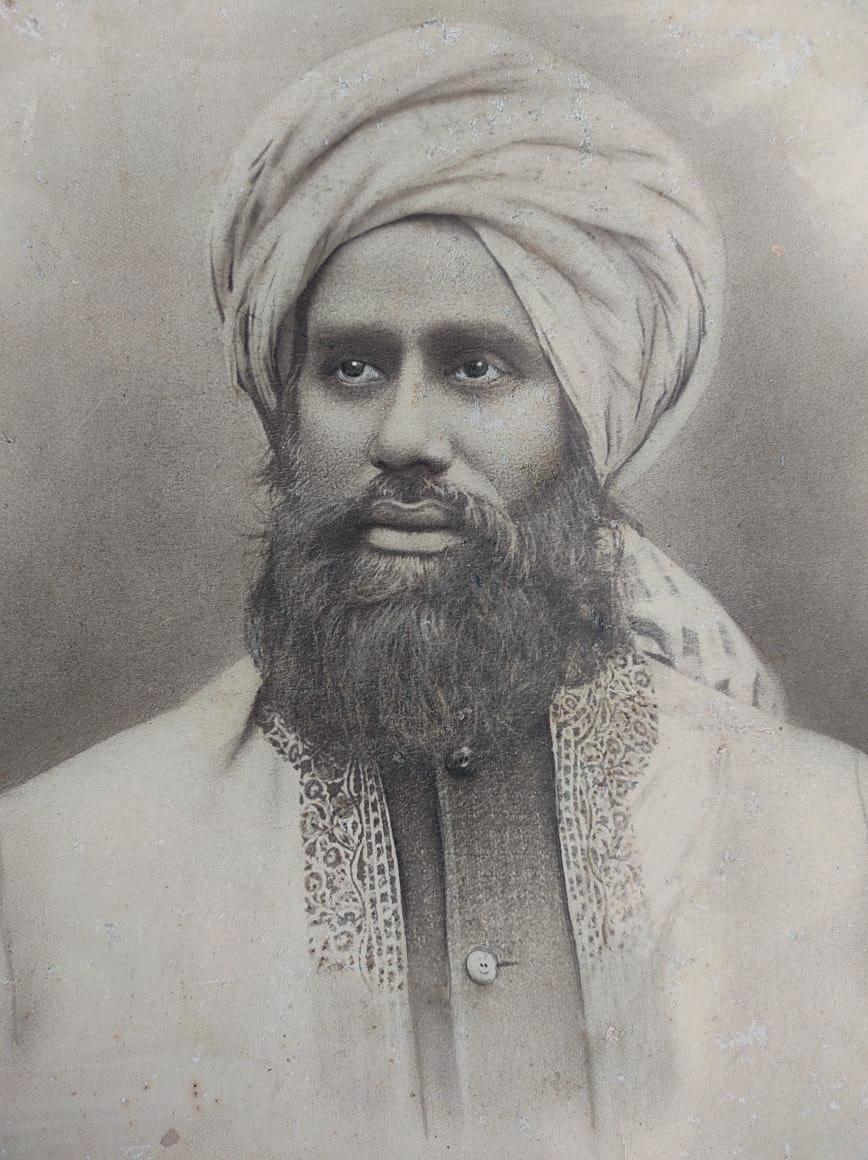
I got the chance to see how highly esteemed these centres of learning were and how cordially he was invited by some of them to join them and also to stay and take it up as a career. He always refused. For instance, Bhopal was a great centre of learning. The Begum of Bhopal and her officials were both fond of Hazrat Hakeem Maulvi Noor-ud-Dinra, respected his knowledge and piety, yet he decided to move on to some other centre. Kashmir was yet another venture of similar nature but the nature of his job provided him several years to remain in the same place.
He served two Maharajas during his stay but was never overawed by the majesty of their courts and palaces. His aversion to worldly lusts and conspiracies kept him reluctant to feel fully a part of it all. The only one factor that kept him there was firstly the opportunity to teach Islam to people of other faiths, or the handsome income
that came with the royal employmentonly to send most of it to his holy master, the Promised Messiahas for the purpose of propagation of Islam.
The most interesting part of my quest came when I found myself stuck at a dead-end - when I realised that more material could be retrieved from the state archives in Jammu.
I cannot but help crediting the breakthrough that came about in just a few days to the prayers and blessings of Huzooraa. I picked up the phone and dialled a number that I had come across on the internet. Getting through to government officials in India and Pakistan is not an easy nut to crack. But, by the grace of Allah, the first number
I dialled and the first person who picked up the phone proved no less that an angel all along - until I had obtained what I required. I would think in sheer amazement when some of their staff would tell me how they had spent all afternoon - or a whole day on some occasions - searching for what I had requested. To conclude this piece, I request the actual article be read which can be found through the links below:
Part I: www.alhakam.org/formative-yearsof-hazrat-hakim-maulvi-nuruddin-part-i/
Part II: www.alhakam.org/formativeyears-of-hazrat-hakim-maulvi-nuruddinpart-ii/
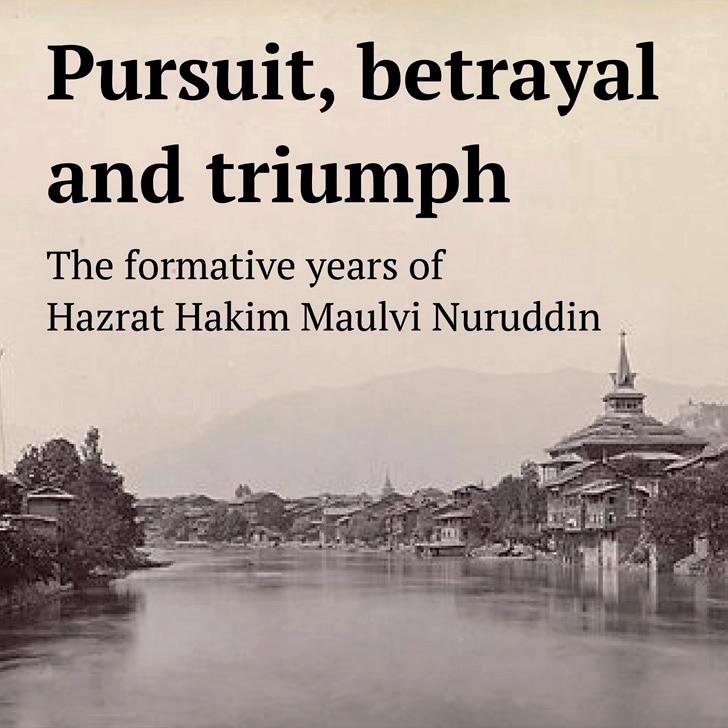
5 AL HAKAM | Friday 4 August 2023 Al Hakam Issue 219 & 220 | 27 May & 3 June 2022
Hazrat Hakeem Maulvi Noor-ud-Din, Khalifatul Masih I | Image: library
Over 200,000 enter Ahmadiyya and ark of Promised Messiah continues to advance
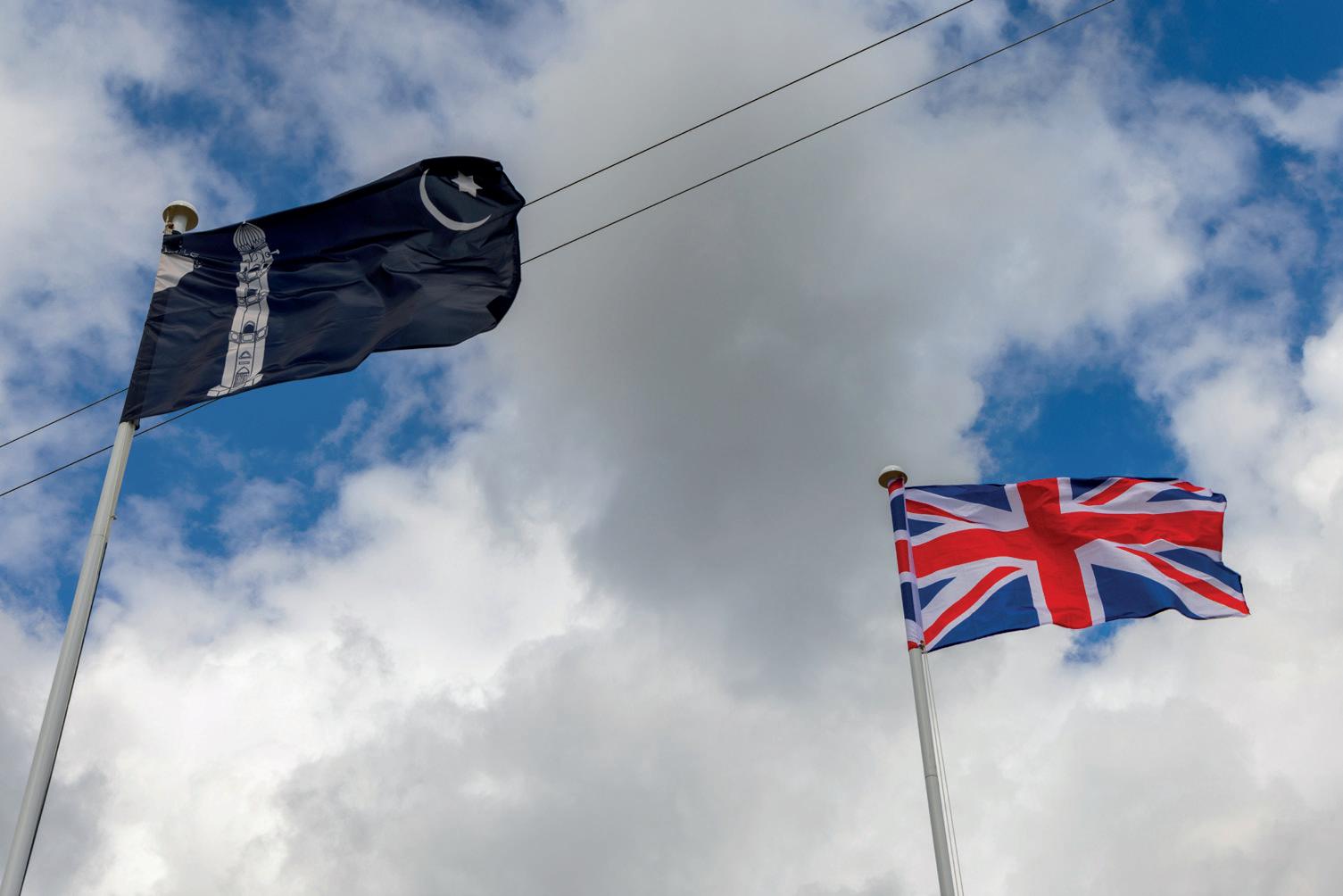
Hadeeqatul Mahdi, 29 July 2023: At around 4:10pm Hazrat Mirza Masroor Ahmad, Khalifatul Masih Vaa arrived at the main jalsa gah. The session then started with the recitation of the Holy Quran, delivered by Alhaj Rashid Khattab Sahib, followed by its Urdu translation from Tafsir-e-Saghir, presented by Hafiz Ejaz Ahmad Sahib:
“But who could do greater wrong than one who forges the lie against Allah while he is called to Islam? Allah guides not the wrongdoing people. They desire to extinguish the light of Allah with (the breath of) their mouths, but Allah will perfect His light, even if the disbelievers hate (it). He it is Who has sent His Messenger with the guidance and the Religion of Truth, that He may cause it to prevail over all religions, even if those who associate partners (with God) hate (it). O ye who believe! shall I point out to you a bargain that will save you from a painful punishment? That you believe in Allah and His Messenger, and strive in the cause of Allah with your wealth and your persons. That is better for you, if you did but know.” (Surah as-Saff, Ch. 61: V. 8-12)
Next, some couplets from “Munajaat awr Tabligh-e-Haqq”, an Urdu poem of the Promised Messiahas were presented by Umar Sharif Sahib. Then, Hazrat Amirul Momineenaa came to the podium and conveyed his salaam to everyone. He then recited, tashahhud, ta‘awwuz, Surah alFatihah and delivered a faith-inspiring address, a brief summary of which is as follows:
Huzooraa said that he usually mentions the rainfall of the blessings of Allah on the Jamaat in this address at Jalsa Salana. He will
mention some of those blessings today.
Establishment of new chapters [jamaats]
Huzooraa announced that 329 new jamaats were established in the past year, and 1016 new places saw the plant of Ahmadiyyat being planted in them. Congo Kinshasa has the most numbers in this regard. There were also other places where small jamaats were established. There are also some incidents with regard to these new jamaats
The missionary from Guinea-Bissau states that were are facing fierce opposition in an area. The chief of the area came to the Jalsa Salana and, upon witnessing the Jamaat and its teachings, said, “I was also an opponent of Ahmadiyyat. However, today, as a result of seeing the Khalifa, I declare that your Jamaat is true.” He then also accepted Ahmadiyyat, along with 400 others and three jamaats were established in that area.
There are many other similar incidents in this regard.
Establishment of new mosques
With regard to mosques, there was an increase of 185 Ahmadiyya Muslim mosques, which included 125 newly established mosques; the rest were acquired. Ghana had the most new mosques. Then there were many other countries. In Pakistan, the government is preventing us from even praying in mosques and is even destroying our mosques, but in other countries across the world, Allah is enabling
us to construct mosques and spread the message of Islam.
In Central Africa, a non-Ahmadi Muslim came and started photographing our mosque. He was told it was constructed by the Ahmadiyya Muslim Community and that it cost 5 million in local currency. He was amazed and said it was beautiful, and that their clerics cannot even build such a mosque with 10 million under the current inflation.
There are many faith-inspiring incidents related to the construction of mosques, too. Huzooraa said we also face opposition with regard to the construction of mosques. However, Allah the Exalted has always blessed us with His immense grace and resolved related issues.
Establishment of mission houses and centres of tabligh Huzooraa announced that 124 new mission houses of the Jamaat were obtained across Africa, Europe, and other continents.
Raqeem Press
According to the report from Raqeem Press, they have published a variety of books, including the Holy Quran as well as the Urdu split-word translation by Hazrat Mir Muhammad Ishaqas. Its edition is userfriendly, easy to read, and is offered at an affordable price.
Wakalat-e-Tasnif
Wakalat-e-Tasnif UK reports that the Holy Quran has been translated into 76 languages
by the Jamaat. Some of the translations are ready for print. Five books of the Promised Messiahas have been translated into English since the last Jalsa Salana UK. Similarly, there are many other books that are being translated. All of these books are available in the bookshop and have been printed in an excellent manner and are offered at a reasonable price. With regard to the layout of the Holy Quran, which has just been mentioned, they have also done some excellent work: On every page, the verse finishes at the same place, i.e., the end of every page. A lot of publication work is also being done by our publications department in India.
A lot of non-Ahmadis also buy our translations of the Holy Quran. In Mali, a non-Ahmadi police officer came and took a copy of the Jamaat’s French translation of the Quran and said he would buy 10 more and place them in the local mosque for everyone’s benefit. He said it is the best French translation of the Quran.
In terms of the books of the Promised Messiahas, they have all been translated into Arabic and published too. A total of 82 books of the Promised Messiahas have been translated into German; 10 this year alone. The books of the Promised Messiahas were also translated into various other major languages of India.
People not only give positive feedback but also convert as a result of reading these books. A Belgian professor from a Christian background did not believe in Jesusas as God. He went out to find the Living God and was given the books of the Promised Messiahas He regularly listened to Huzoor’saa sermons and eventually, he pledged bai‘at
Wakalat-e-Ishaat (Publications)
According to Wakalat-e-Ishaat, 5.89 million copies of various books and pamphlets etc. were published in 47 languages. 124 periodicals and magazines are also published by various jamaats and auxiliary organisations around the world. These are published in 26 different languages; there is a lengthy list of these, too.
Wakalat-e-Ishaat (Tarseel)
According to the report of Wakalat-e-Ishaat (Tarseel), over 166,000 books have been dispatched to 45 countries in 24 languages. In various countries, books and pamphlets covering 884 different topics were freely distributed in a quantity exceeding 9,9 million. Through this, the message of Islam reached over 1,5 million individuals
Friday 4 August 2023 | AL HAKAM 6
و بذکلا ہللا یلع یرتفا نمم ملظا نم و موقلا یدہی ال ہللا و ؕ مالسالا یلا یعدی وہ ہللا و مہہاوفاب ہللا رون اوـفطیِل نودیری نیملظلا ہلوسر لسرا یذلا وہ نورفکلا ہرک ول و ہرون متم ول و ہلک نیدلا یلع ہرہظیِل قحلا نید و یدہلاب یلع مکلدا لہ اونما نیذلا اہیای نوکرشملا ہرک ہللاب نونمؤت میِلا باذع نم مکیجنت ۃراجت و مکِلاوماب ہللا لیبس یف نودہاجت و ہِلوسر و نوملعت متنک نا مکل ریخ مکِلذ ؕ مکسفنا
Photo courtesy AMA UK
worldwide.
Exhibitions, bookstalls & book fairs
Through exhibitions, bookstalls & book fairs, a lot of good work is being carried out. According to the current report, 9166 exhibitions were held and over 420.000 people were reached through this. 1774 translations of the Holy Quran were distributed freely. Over 8500 book stalls and book fairs were held, through which 1.7 people were reached.
There are many faith-inspiring incidents related to these efforts as well, of people who were positively impacted by Jamaat’s stalls and literature.
Libraries
We have over 600 regional and central libraries. Books are sent to them from London and Qadian.
Wakalat Tamil-o-Tanfidh
Wakalat Tamil-o-Tanfidh reports that many of the Promised Messiah’sas books have been translated into various languages of the region under their care.
Arabic Desk
Under it, last year, 178 books and pamphlets were published. They also prepared Malfuzat in Arabic, ready to be printed. Many books of Hazrat Musleh-eMaudra are being translated and prepared. Then there are many other books.
Huzooraa then narrated some incidents from the many of the Arabs who were impacted by the literature and tabligh of the Jamaat.
One lady said she had come to know about Ahmadiyyat through MTA. She prayed and saw a dream in which she saw a man she did not recognise. Later, she was switching through TV channels and saw the same man; he was Hazrat Khalifatul Masih IVrh
Russian Desk
Under the Russian Desk, translations of the Holy Quran as well as numerous books of the Promised Messiahas have been completed and are in the final stages of revision. Some of Hazrat Khalifatul Masih’saa smaller books and many other books have been translated by them. Many of their translations have been uploaded onto their website, and many thousands have subscribed to their social media channels, which have a lot of content. There is a separate website in the Kyrgyz language.
Bangla Desk
Huzooraa said the Bangla Desk was also carrying out many programmes. They have translated the Holy Quran as well as books of the Promised Messiahas as well as other books into Bangla. Many hours of Bangla programmes have been prepared for MTA. They have translated many books; however, they needed to speed up their work.
French Desk
Huzooraa said the French Desk is also translating books, and preparing French programmes, thereby introducing Islam Ahmadiyyat to the world.
Turkish Desk
The Turkish Desk has translated many of the books by the Promised Messiahas. They are presenting programmes on MTA.
Chinese Desk
They are translating books into Chinese. Recently, they have translated Hazrat Ch. Zafrulla Khan’sra book on the status of women. They also working on numerous other books.
Swahili Desk
They are also carrying out translation work on MTA and preparing literature.
Indonesian Desk
They are also carrying out translation work on MTA and preparing literature.
Spanish Desk
They are doing good work. They have translated various books by the Promised Messiahas into Spanish. They regularly translate Huzoor’saa addresses, etc., into Spanish.
Persian Desk
This Desk has been established here and is doing translations of various books.
Distribution of Leaflets
Over 11 million leaflets were distributed in 107 countries, and through them, the message of Islam Ahmadiyyat reached over 18 million people. Countries across the world have participated in this, and there are many faith-inspiring stories related to it.
A missionary from Nigeria reports that during the leaflet distribution, a man came to us, and it was Friday. The man, after listening to the Friday sermon, said he cannot believe in Ahmadiyyat yet. He was given books to study and he accepted Ahmadiyyat.
In the UK, a Jewish professor of economics accepted Ahmadiyyat upon being introduced by a leaflet.
The Review of Religions
The Promised Messiahas established this magazine. It has been published for 121 years. Over 200,000 copies were published this year. It is now published in multiple languages. By the grace of Allah, it has gained a lot of recognition worldwide.
Al Fazl International
In 2019, Huzooraa made Al Fazl into a twice-weekly publication and is now a daily newspaper of the Jamaat. They also have a children’s Al Fazl and special numbers. It is banned in Pakistan. Through social media, they reached millions of people over the year.
Al Hakam
Al Hakam publishes weekly. It is also available online and is sent to various libraries. By the Grace of Allah, it is making steady progress.
International Translation Office
It is translating the commentary of Shaih al-Bukhari. It is also preparing many other books.
Makhzan-e-Tasaweer
They have 1.3 million photographs and objects. There was an increase of 801 items this year.
Waqf-e-Nau
The total number of waqifeen-e-nau is 80,600, among them are 47,000 boys and 33,000 girls, or just about that many. More requests and applications are made regularly. Those, who are over 15 years old, now number over 39,000.
Ahmadiyya Archive & Research Centre (AARC)
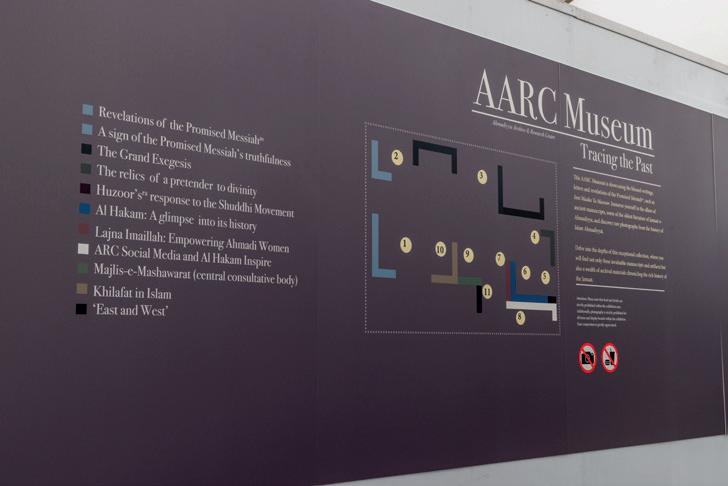
AARC has the task of preserving the tabarrukat of the Promised Messiahas as well as the Khulafa. Some items related to Hazrat Khalifatul Masih Ira were obtained from Jammu and preserved. Various old newspapers and photographs of Hazrat Musleh-e-Maudra were obtained and preserved. They have also connected with various universities and they introduce them to the Ahmadiyya archive and encourage them to research into the Ahmadiyya Muslim Community. They are carrying out various kinds of other work too.
Ahmadiyya radio stations
Right now, the radio stations of the Ahmadiyya Muslim Community number 25. There is a lot of work happening for tabligh or propagation, through these stations. There are also radio stations in Arabic, Turkish, and German that operate from Germany. Radio Voice of Islam UK’s scope was expanded this year. It is being received very well. Through Ahmadiyya radios, many bai‘ats are also taken place.
International Association of Ahmadiyya Architects & Engineers (IAAAE)
They are doing good work by the grace of Allah.
AMJ
Various kinds of good work are being carried out by them too.
Central Legal Department
They have given excellent advice on various matters over the year.
Nusrat Jehan Scheme
In 13 African countries, there are 37 hospitals and clinics that operate under this scheme. Here in the UK, the Nusrat Jehan board was established and they are doing good work. They also operate hundreds of schools.
Humanity First
IT
The Central Department of IT is also carrying out good work. Ghulam Qadir Shaheed IT Research Institute has been established by them in Ghana and Nigeria. They also assist the various central departments.
Press and Media Office
They are doing good work and are connected with various media outlets, resulting in the introduction of Jamaat. They also visited educational institutions during the year and also guided media outlets in many other countries of the world.
Alislam website
Many books of the Jamaat are being computerised further and uploaded, and numerous apps are being developed and improved. Many other features and offerings of the website are being improved. Their work is mainly done by volunteers.
MTA
506 people work at MTA, most of whom are volunteers. There are eight channels in total, which operate 24 hours a day. During the year, numerous new MTA studios have also been established in various countries. Moreover, MTA6 Asia and MTA7 Asia have also started streaming. MTA is also available in HD in UK and Europe.
MTA Africa has been progressing on many fronts. MTA Africa now has 12 branches in total. People are also accepting Ahmadiyyat by watching MTA.
Humanity First has been registered in 29 countries. Now, hospitals are also being established under Humanity First. So, they are not only providing emergency aid but also regular services. They conduct charity walks. Contact is also being established with prisoners for their reformation, tabligh and well-being.
Contact with new-Ahmadis
Thousands of new Ahmadis were contacted across the world, in order to make them part of the mainstream. Over 41,000 spiritual training and tarbiyat courses were held for them in various jamaats of the world.
Bai‘ats
Huzooraa narrated numerous incidents of people accepting the Promised Messiahas and entering into the fold of Ahmadiyyat. Huzooraa announced that over the year Allah enabled 217,168 souls to accept Islam Ahmadiyyat. Nigeria achieved the most bai‘ats. Huzooraa said, there are countless faith-inspiring incidents related to this, but they cannot all be narrated at the moment due to the shortage of time.
Huzooraa prayed that may the Almighty Allah, who continues to shower His blessings upon the Ahmadiyya Community, eternally sustain this grace, and may we always be the recipients of His divine favours. May we never commit any act that could, in any way, incur the displeasure of Allah the Exalted. Amin Huzooraa then conveyed salaam to everyone and the session came to an end.
7 AL HAKAM | Friday 4 August 2023
Photo courtesy AMA UK
Hazrat Khalifatul Masih V speaks of great female companions of Prophet Muhammad
Hadeeqatul Mahdi, 29 July 2023: Hazrat Khalifatul Masih Vaa arrived at the Lajna marquee for his address.

To commence the formal session, Hazrat Amirul Momineenaa called Hibbatul-Rahman al-Jabi Sahiba to recite a portion of the Holy Quran: Surah al-Hadid, Ch.57: V.21-24. The Urdu translation was read out by Qurratul-Ain Sahiba. An Arabic qaseedah written by the Promised Messiahas in praise of the Holy Prophet Muhammadsa was then presented by Baraa Rashad Odeh Sahiba, followed by its Urdu translation by Durr-e-Ajam Ahmad Sahiba. Kashifa Qamar Sahiba then recited an Urdu poem written by Hazrat Musleh-e-Maudra Hazrat Amirul Momineenaa then called Secretary Umur-e-Talibaat to announce the names of those Lajna students who achieved academic excellence.
Huzooraa then came to the podium to deliver his address. After tashahhud, ta‘awwuz and Surah alFatiha. Huzooraa announced that he had chosen various examples and incidents from the lives of the female companions of the Holy Prophetsa, from which the Lajna could attain great examples. Huzooraa said that these incidents were so numerous in number that it was not possible to narrate them all. These examples show the love these female companions had for Allah, Islam, and the Holy Prophetsa as well as their great examples of sacrifice, charity, and even the upbringing of their children.
Huzooraa said these women, before Islam, loved the world; however, after accepting Islam, they sacrificed everything for the love of Allah and His Messengersa
What were the examples of their worship? What was their state?
Hazrat Hamnara bint Jahash narrated that once the Holy Prophetsa entered the mosque, he saw a rope tied between two pillars. The Holy Prophetsa asked what the purpose of these ropes was. He was informed that Hamnara Bint Jahash would use these ropes for support when she tired during worship. The Holy Prophetsa said that if she should only worship according to her strength, and if she is tired, she should sit down. The Holy Prophetsa said that one should worship when they are energised, and if they are tired, they should sit down and worship. (Sunan Abi Dawud, Kitab attattawu‘, Bab an-nu‘as fi s-salah, Hadith #1312)
From this, we learn that the female companions were eager to worship Allah and that the Holy Prophetsa stressed the importance of worship, but with balance, after which one could also continue worshipping in the future consistently without tiring.
Hazrat Aishara was with a woman once,
and after seeing her, the Holy Prophetsa asked who she was. Hazrat Aishara said that she worshipped all night without sleeping; to this, the Holy Prophetsa said that one should only do what they were capable of doing and that Allah never tires, but humans do. The Holy Prophetsa also said that the best deeds are those that are performed with consistency.
Hazrat Abdullah bin Abbasra narrated about her mother, saying that she loved keeping fasts and would fast every Monday and Thursday.
Hazrat Maymunara bint Harith narrated that once the Holy Prophetsa was distributing war booty amongst the muhajirun. Hazrat Zainabra bint Jahsh said something, upon which Hazrat Umarra rebuked her. To this end, the Holy Prophetsa told Hazrat Umarra to leave them as they were.
These female companions also possessed great love for the Holy Prophetsa Once, Hazrat Musleh-e-Maudra said that during the Battle of Uhud when word had falsely spread that the Holy Prophetsa had passed away and the Muslim women began running towards the battlefield, amongst them a woman was constantly told that her close relatives had died including her father, husband, etc., during the battle. However, every time she was told this, she would say how is the Holy Prophetsa! In great anguish and pain, she would ask, “What has the Holy Prophetsa done!” Hazrat Musleh-e-
Maudra said that these words of worry were certainly exclaimed by a woman, as no man could utter them. They are uttered when by women when a beloved departs from them, i.e., “What have you done by getting martyred and leaving us alone!” However, once she was told that the Holy Prophetsa was alive, she said, she does not care about anyone else as long as the Holy Prophetsa is alive and well.
Another incident about an elderly lady is that when the Holy Prophetsa returned from the Battle of Uhud, the children and women came out of the city of Medina to welcome him back. The Holy Prophet’ssa camel’s reign was held by Hazrat Saad bin Muazra who was proudly walking in front. He then met his elderly mother, who had come out of Medina to meet the Holy Prophetsa. One of her sons was killed in Uhud. Her eyes had weakened, and she was eagerly trying to find the Holy Prophetsa. Hazrat Saad bin Muazra thought that if his mother heard about the death of her son, then she would not be able to bear this pain. He thought that the Holy Prophetsa should console her, and so he indicated this to the Holy Prophetsa and said ‘O Prophet, here is my mother”. The Holy Prophetsa informed her about the death of her son. In reply, the lady managed to find the direction of the Holy Prophetsa and whilst drawing closer and looking towards his face, she uttered:
“O Prophetsa, when I have seen you safe
and sound, then know that I have eaten the pain of the death of my son!”
This was the great love and sacrifice the female companions had for the Holy Prophetsa. Hazrat Anasra narrates that Hazrat Umm-e-Sulaimra, an aunt of the Holy Prophetsa, would lay a leather skin down for the Holy Prophetsa on which he would sleep. Once, when the Holy Prophetsa was sleeping on it, Hazrat Umme Sulaimra, out of love and reverence for the Holy Prophetsa, collected his hair and sweat and mixed it with perfume. Once the Holy Prophetsa asked her what she was doing, to which she replied that she was collecting this for blessings for her children. The Holy Prophetsa replied by saying: “You have acted rightly”.
Hazrat Zainabra bint Abi Salma said that she went to Hazrat Umme Habiba’sra house when her father, Hazrat Abu Sufyanra, passed away. Hazrat Umme Habibara called for something fragrant and rubbed it on another lady and then herself. She then said that she did not need to do this; however, the Holy Prophetsa said that a woman cannot mourn for more than three days (apart from the death of her husband), and that’s why she applied perfume.
Hazrat Fatimara bint Qais said that the Holy Prophetsa sent a proposal to her for marriage to Hazrat Usamara Bin Zaid, his servant. She had heard the Holy Prophetsa say that whoever loved the Holy Prophetsa should also love Usama. When
Friday 4 August 2023 | AL HAKAM 8
Photo courtesy AMA UK
the Holy Prophetra asked her about this proposal, she said that the matter was completely up to the Holy Prophetsa and she would follow in complete obedience.
Once the Holy Prophetsa said to an companion from the Ansar to give his daughter (in marriage). The companions said, “Very well, O Prophetsa!” The Holy Prophetsa replied by saying that the proposal was not for himself but for another servant companion: Hazrat Julaibeebra The Ansari companion sent this proposal to the mother, who at first wanted to accept it, thinking it was the Holy Prophetsa himself who wanted to marry her daughter, but when she learnt that the proposal was meant for Julaibeebra, she immediately rejected it, thinking it was beneath her. The girl for whom this proposal was made heard this conversation and said to her own parents that she would comply with whatever the Holy Prophetsa said and would never reject it. It is narrated that in the Battle of Uhud, this husband of hers was martyred. The Holy Prophetsa especially prayed for her, and it is narrated that she became one of the most wealthy women of Medina.
Hazrat Khadijara also made great sacrifices. Hazrat Aishara narrated that the Holy Prophetsa would always remember and talk of Hazrat Khadijara and never fail to do so. Once, Hazrat Aishara asked the Holy Prophetsa why he always spoke of an old woman when the Holy Prophetsa had been given better wives after her. The Holy Prophetsa, in anger, replied that he was not given any wife greater than her, as she believed in him when no one else did, supported him, and also bore the Holy Prophet’ssa children.
When Hazrat Khadijahra embraced faith, she could not have known the blessings that Allah Almighty had destined for her as a result of that faith. Indeed, she sacrificed all her wealth in the service of Islam and the Messengersa of Allah. She endured poverty and hardship despite being the wealthiest woman in Mecca, dedicating her life to the cause. For three consecutive years, she supported and endured such trials alongside her husband in Shi’b Abi Talib, where they were forced to live in seclusion. However, Allah showered His blessings upon her sacrifices to the extent that even today, she is held in high esteem and respected by the Muslim world.
Moreover, Allah instilled such love for her in the heart of the Holy Prophet Muhammadsa that during the Battle of Badr, when the captives of war included her sonin-law, Abu al-’As, Hazrat Zainabra, who was
still in Mecca at that time, sent her necklace as a ransom for him. This necklace was the same one that Hazrat Khadijahra had given to her daughter as part of her dowry. When the Holy Prophetsa saw this necklace, he was reminded of Hazrat Khadijahra, and tears welled up in his eyes. He then said to his companions, “If you wish, let this keepsake of Khadijah remain with her daughter.”
(Tafsir-e-Kabir, Vol. 7)
Hazrat Aishara would also make great financial sacrifices, and there are a lot of narrations that support this. Hazrat Abdullah ibn az-Zubairra would say that he had not seen anyone more generous than Hazrat Aishara. She also narrated that
Muslims should go out and attack the Romans. The Holy Prophetsa said that all pious people should go out to fight them. After a companion, who was away for some work, returned home to Medina, he wanted to show affection to his wife after returning from a trip, but his wife pushed him away and said, “Are you not ashamed that the Holy Prophetsa is out fighting and you are here?” The companion realised the intensity of the situation and immediately left to fight. It was not that this female companion did not love her husband; rather, she realised the protection of the Holy Prophetsa and Islam was much more important than her love for her husband.
themselves cannot see anything. This is from the heavens, and it was Allah’s decree that I lost my sight. My Lord has the power to enable me to see again.”
This was her reply to the disbelievers. The next morning, when she woke up, Allah the Almighty had restored her eyesight, and she was able to see again. Upon this, the Quraish said, “This is because of Muhammad’s sorcery.” When Hazrat Abu Bakrra saw the pain and suffering inflicted on her, he bought her and set her free.
During the Battle of Qadisiyya, at the time of Hazrat Umarra, Chosroes brought elephants to the battlefield to scare away the camels. This resulted in great losses for the Muslims. A day before the fiercest day of the battle, Hazrat Khansara took her four sons to the battlefield and sent them to fight for the Muslim army, even to the death. She later prayed to Allah in isolation to bring her sons back safely, and Allah listened to her prayer.
once some of the Holy Prophet’sas wives asked him who would meet him first (after death). The Holy Prophetsa replied by saying that the one whose hands were the longest. Hearing this, they began measuring the size of their hands, and Hazrat Sauda’sra hand was the longest. However, later they realised that this meant the wife who gave the most charity would meet him first, and thus Hazrat Zainabra passed away first after the demise of the Holy Prophetsa
Huzooraa said that there are many Ahmadi women who also do not care for their wealth and jewellery and donate it openly and willingly to Allah’s cause.
Speaking about some of the cruelty the female companions faced, Huzooraa gave the example of the family of Hazrat Yasirra Once, the Holy Prophetsa was passing by them and saw them being persecuted, to which the Holy Prophetsa said “Patience, O family of Yasir!”. Some time later, Abu Jahl killed Hazrat Yasir’sra father and then also stabbed his mother, Hazrat Sumaiyyara with a spear, resulting in her martyrdom.
Hazrat Musleh-e-Maudra said that when news came that the great and mighty Roman Empire was going to attack the Holy Prophetsa and the Muslims, it was a grave and dangerous situation. The Holy Prophetsa said that instead of the Romans attacking the Muslims in their town, the
When Hazrat Umme Shareekra accepted Islam, her polytheist family members captured her and tortured her greatly for three days. They then told her to leave Islam; however, she could not hear them properly due to the immense torture inflicted upon her. She narrated that she did hear them telling her to reject Tawhid and in response, she said she would never leave Tawhid and was ready to die for this.
Hazrat Abu Bakrra once passed a Muslim slave who was being persecuted by Hazrat Umar (when he had not yet accepted Islam). Hazrat Umarra, at the time, told her that he only took breaks from beating her because he was tired; otherwise, he would not stop. In response, Hazrat Abu Bakrra also paid for her freedom.
Hazrat Zinnirahra ar-Rumiyyah was among the early female Muslims and accepted Islam in the beginning. The idolaters would inflict cruelties on her. She was the female slave of the Banu Makhzum. Abu Jahl would persecute her. It is recorded that she was the slave of Banu Abd al-Dar. When she accepted Islam, she lost her eyesight. Upon this, the idolaters said that Laat and Uzza caused Zinnirahra to lose her eyesight because she rejected them. Upon this, Zinnirahra said, “Laat and Uzza do not even know who worships them, how could they take away my sight when they
Huzooraa also spoke of a narration in which a female companion mother encouraged her child not to share any secrets that the Holy Prophetra had given them. Huzooraa said all Ahmadis should reflect on this too and not reveal secret matters to others.
Hazrat Khalifatul Masihaa said that all Ahmadis must try to follow these great companions and their examples.

Huzooraa said that though lots of Ahmadi women are sacrificing a lot of wealth in this era for the cause of Allah, those women who are financially affluent should give special focus to sacrificing their wealth in Allah’s way. If their husbands stop them from doing so, then they should clearly tell them that in religious matters they will not listen to them.
Huzooraa said that in today’s era, it is the Ahmadiyya Muslim Community that has the honour of sacrificing their lives too, and this was also due to the upbringing given to children by Ahmadi mothers. Huzooraa said that there are lots of Ahmadi mothers who write to him and declare that they are also ready for their children to be sacrificed in Allah’s way. Huzooraa said that Ahmadi mothers should instil such religious importance within their children, that they always give preference to faith in all situations.
Huzooraa prayed for all Ahmadi women to attain these great heights and said that by the betterment of women, men will also be guided.
In the end, Huzooraa led everyone in silent prayer, which was followed by various choral poems read by Lajna.
9 AL HAKAM | Friday 4 August 2023
“ In today’s era, it is the Ahmadiyya Muslim Community that has the honour of sacrificing their lives too, and this was also due to the upbringing given to children by Ahmadi mothers.
Leaving Allah leads to Satan’s grasp
Huzoor emphasises taqwa at Jalsa Salana UK’s inaugural address
At approximately 4:30pm on Friday 28 July 2023, Hazrat Khalifatul Masih Vaa hoisted the Liwa-e-Ahmadiyyat and then made his way to the main Jalsa marquee for the inaugural session of Jalsa Salana UK 2023.
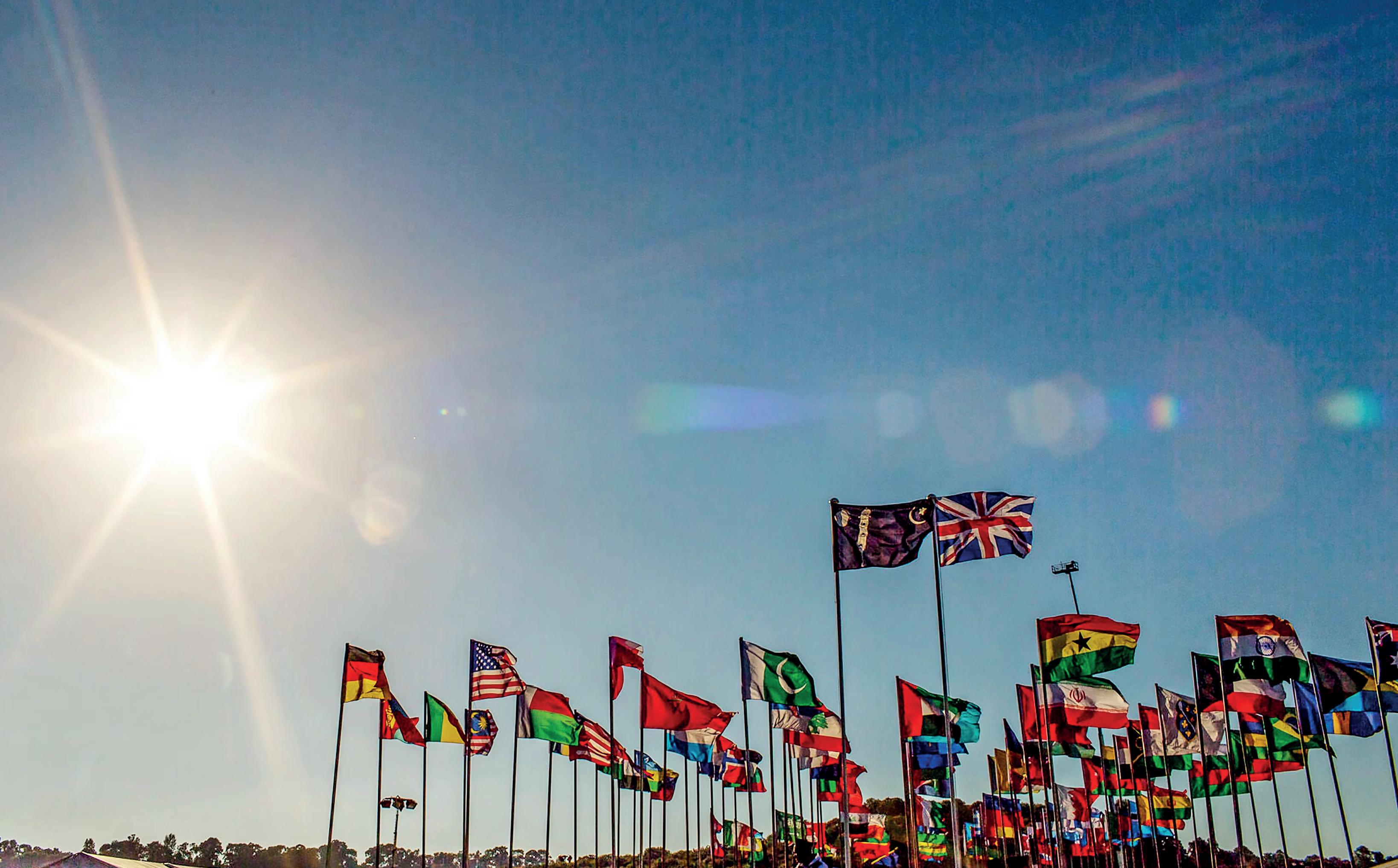
After arriving on the stage, Hazrat Amirul Momineenaa invited Feroz Alam Sahib to recite a portion of the Holy Quran: Surah an-Nur, Ch.24:V.52-57, followed by its Urdu translation. Syed Ashiq Hussain Sahib then presented a Persian poem written by the Promised Messiahas followed by its Urdu translation, composed by Hazrat Mir Muhammad Ismaelra. Murtaza Mannan Sahib then presented an Urdu poem written by the Promised Messiahas Hazrat Khalifatul Masih Vaa then delivered his address for the inaugural session. After reciting tashahhud, ta‘wwauz and Surah al-Fatihah, Huzooraa said the Promised Messiahas explained that a grand purpose of Jalsa Salana is that the attendees are able to attain taqwa and righteousness, after which they will attain closeness to Allah, traverse His path, and ultimately be diligent in His worship. The Promised Messiahas did not merely tell his Community members to attain taqwa; with great fervour and pain, he also showed them the paths of attaining taqwa in accordance with the Holy Quran and the Holy Prophetsa. The Promised Messiahas would always say that if the root of taqwa is present in someone, they have everything.
In one instance, the Promised Messiahas said that for the betterment of the Jamaat, it is essential that they are informed and explained about taqwa, as every intelligent person understands that without taqwa, Allah cannot be pleased. Allah states:
نونسحم مہ نیذلاو اوقتا نیذلا عم ہللا نا
Verily, Allah is with those who are righteous and those who do good. (Surah an-Nahl, Ch. 16. V.129)
A muttaqi is one who fears Allah, always wants His pleasure, and hopes that Allah becomes his Shield and Protector. This is the definition of a muttaqi that we should keep in mind. The next stage is that of a mohsin, who brings others to Allah’s path as well. Therefore, a believer should be a muttaqi and a mohsin. By possessing both of these qualities, one is also able to help humanity at large.
A believer should therefore not be content with one stage; rather, they should ponder over how they can enter the ranks of the mohsinun and help Allah’s creation as well. True righteousness and belief are that one is a mohsin as well.
The Promised Messiahas also said that taqwa is to stay away from minute evils.
One is not a muttaqi if they merely stay away from the very basics, such as stealing or looting. Staying away from these ills is not a great feat; rather, true goodness is that one helps Allah’s creation and is ready to give his life for the cause of Allah.
The Promised Messiahas said that merely staying away from evil deeds is not goodness in itself unless one also helps and serves Allah’s creation. There are many who stay away from sin, but they do not attain any significant spiritual status. An example of true taqwa is like cleaning a dish and putting high-quality food inside it. In this way, taqwa is like cleaning the dish of nafse-ammarah but cleaning is not enough; the dish then needs to be filled with spiritual nourishment.
The Promised Messiahas spoke of three stages of the soul: Nafs-e-ammarah (where the soul is under the control of Satan and is at the lowest stage of a spiritual condition), the second stage is nafs-e-lawwamah, and the third is nafs-e-mutmainnah. The Promised Messiahas said everyone should escape nafs-e-ammarah and then strive in the path of Allah, after which nafs-elawwamah starts. In this condition, the soul strives to escape the shackles of Satan and is in constant battle. At times, the soul slips and Satan influences it, and at other times, the soul overcomes Satan. The Promised Messiahas said such a person is in a state of battle and requires the help of Allah. They should always seek Allah’s forgiveness and
continue to strive for betterment. In the end, Allah enables them to escape nafse-lawwamah and enter the ultimate stage of nafs-e-mutamaina. In this, they now truly believe in Allah and are sure that “Allah does indeed exist”. They have complete belief in Allah and are able to carry out deeds that are of the highest standard.
The Promised Messiahas said that the level to which one believes or does not believe in Allah is reflected in one’s actions too. The more they believe in Allah, the better their actions are. If one truly believes in Allah, it cannot be that they commit sin, as this belief cuts the connection between their soul from the self that incites. The Promised Messiahas said that our Jamaat must attain this spiritual condition.
The Promised Messiahas said that the first obligation upon his Community was to attain true belief in Allah. Huzooraa said that we must reflect deeply on this.
The Promised Messiahas said that Allah always helps the person who possesses taqwa and is also a mohsin; they also help others. The Promised Messiahas said that he received the following revelation countless times, maybe even 2000 times:
Verily, Allah is with those who are righteous and those who do good. (Surah an-Nahl, Ch. 16. V.129)
Therefore, a person should always reflect
on their daily actions and see where they have done well. The Promised Messiahas also said that a believer should never remain in one spiritual condition, they should always be excelling. Huzooraa said we must all excel in good deeds, it is then that we are fulfilling our pledge.
The Promised Messiahas said that in the Jamaat, there are trivial arguments between each other that then grow out of control. The Promised Messiahas exhorted his Jamaat to make peace between their brethren and to forgive one another. One should never attack the honour of a fellow believer. The Promised Messiahas narrated the story of a king who would write the Holy Quran. A cleric said to the king that you have written a certain verse incorrectly, and so the king drew a circle around the portion that the cleric pointed out. After the cleric left, the king did not change anything and was asked why he had drawn the circle then. The king replied by saying that the cleric was actually wrong but did not want to offend him. Thus, we should not hasten to argue, quarrel, or pick out the faults of our brethren.
The Promised Messiahas said that Allah protects a muttaqi from the trials of the world. If Jamaat members had all the ills that others also possessed, then what is the purpose of doing bai‘at? We should strive to instil true taqwa within ourselves.
The Promised Messiahas said that it is not right to annoy and inflict pain upon fellow believers over trivial matters. Allah does not
Friday 4 August 2023 | AL HAKAM 10
نونسحم مہ نیذلاو اوقتا نیذلا عم ہللا نا
| Image: library
like such ways. The Holy Prophetsa came to create a revolution, and we should strive to attain such a spiritual level.
The Promised Messiahas said that one should have absolute love and kindness towards their brethren and live a life of goodness and love.
Huzooraa said that we are gathered at Jalsa Salana to attain these high moral and spiritual standards. If we achieve these standards, then Allah will protect us from the attacks of our enemies.
The Promised Messiahas states:
“True fear of Allah demands that a person examine the degree to which his words and actions accord with one another. A person whose words and actions are at odds with one another should know that they shall incur the wrath of Allah. If one’s heart is impure, it will never find favour in the sight of God no matter how pure one’s words may be; in fact, this arouses the wrath of God. My community ought to realise that they have come to me so that I may sow the seed which transforms them into a fruitful tree. So, everyone ought to examine themselves to become cognisant of their inner and outward state. If, God-forbid, the hearts of my followers are not in harmony with their words, they shall not be met with a blessed end. Allah the Exalted does not care for a community with hollow hearts who make empty claims, for He is SelfSufficient. The victory at Badr had already been prophesied and there was every reason to believe that the Muslims would triumph. But the Holy Prophet, peace and blessings of Allah be upon him, continued to weep and pray to his Lord. Hazrat Abu Bakr Siddiqra inquired as to the need for such fervent supplication when victory had already been promised. The Holy Prophet, peace and blessings of Allah be upon him, said, ‘God is Self-Sufficient.’ That is to say, perhaps hidden conditions lay beneath the surface of this divine promise.” (Malfuzat, Vol. 1, p. 10)
Huzooraa said that it is essential we develop the fear of Allah within ourselves and for this taqwa is essential. But how can one know they have Allah’s fear? The Promised Messiahas answered this by saying that one should see whether their deeds and actions tally with one another. If they do not, then one has not attained taqwa
The Promised Messiahas said that his Jamaat should know that they have come to him so that the seed of a fruitful tree could be sown within them. However, if Jamaat members were in a condition where their words and deeds contradict one another, then we should remember that Allah is al-Ghani; He does not care. Prior to the Battle of Badr, Allah gave promises of victory to the Prophetsa but he continued to pray because Allah is al-Ghani and it could be that there were hidden conditions in the promises He had made.
Huzooraa said that Divine promises to the Jamaat would be fulfilled when Jamaat members have such a spiritual state that their words and deeds coincide.
Allah also says that whoever fears Allah, then Allah creates a way out of them from every difficulty and provides for them.
The Promised Messiahas said:
“We should always appraise the degree to which we have progressed in righteousness and piety. The criterion for this is the Quran. From among the hallmarks of the righteous, one sign manifested by Allah the Exalted in
favour of a pious one is that He frees them from the unpleasant things of this world and Himself becomes the Guardian of their affairs. Allah the Exalted states:
“And he who fears Allah — He will make for him a way out, and will provide for him from where he expects not.” (Surah at-Talaq, Ch.65: V.3-4)
“Allah the Exalted delivers a person who fears Him from any affliction that may befall him, and grants him provision from where he expects not. In other words, one sign of a righteous person is that Allah the Exalted does not enslave him to the recourse of immoral ways and means. For example, a shopkeeper believes that his business cannot operate without the support of falsehood; for this reason he does not refrain from deception and expresses the need for speaking lies. However, this so-called need is completely unjustified. God Almighty becomes the Protector of a righteous person and saves him from such instances as would compel them to speak untruths. Remember, when a person abandons Allah the Exalted, God forsakes such a person as well. Moreover, when the Merciful God leaves a person, Satan definitely develops a relationship with such a one.
“Think not that Allah Almighty is weak. Indeed, He is the possessor of immense power. When you put your trust in Him for support in any matter, He shall come to your aid.
And he who puts his trust in Allah — He is sufficient for him. (Surah at-Talaq, Ch.65; V.4)
“However, those who were first addressed in these verses were people of faith. All of their thoughts revolved around religion and they left their worldly affairs to God. This is why Allah the Exalted reassured them and told them that He was their support. And so, one of the blessings of righteousness is that Allah the Exalted grants security to a pious person from the afflictions that impede upon his religious affairs.”
The Promised Messiahas said that a true muttaqi uses their God-given abilities in lawful ways and does not waste those abilities. Allah says that those who are true believers – they fear Allah, pray to him regularly, give charity, believe in His books, etc – are those who are on the right path.
He said:
“None of the faculties endowed by Allah Almighty have been granted to man so that they may be wasted; rather, their discipline and proper use is the true means by which they are nourished and developed. This is why Islam has not taught that the faculties of virility be slaughtered completely or that the eye be gouged out. Instead, it teaches their proper use and the purification of one’s inner self. In this respect, Allah the Exalted states:
“‘And it is they who shall prosper.
“That is to say, those who tread the path of righteousness; those who believe in the unseen; those who establish or set upright their Prayer when it begins to fall as it were; those who give from that which is bestowed to them by God; those who, irrespective of their own thoughts and fancies, believe in all the divine scriptures sent by God, ultimately attain to the level of certainty. It is these very people who are truly guided and who tread a path that goes on to lead a person to success. Therefore, it is such people who are triumphant and who shall reach their final destination, and who have been delivered from the perils of the journey before them. Hence, from the very outset, Allah the Exalted has given us a teaching of righteousness and bestowed upon us a book, which also provides counsel on how to develop piety. And so, let my community grieve, more than anything else, over whether they possess righteousness or not.” (Malfuzat [English],Vol. 1, pp. 34-35)
Huzooraa said we should all introspect and see how much we are striving to attain these levels of taqwa
Another trait related to taqwa is that they live a simple life, remain humble and remain away from anger which then gives birth to arrogance. The Promised Messiahas exhorted that he did not wish for any of his Jamaat members to look down upon others. Allah truly knows who was high in rank.
No one could attain a respectable condition without taqwa and only Allah knew who was great in rank. No family relation, no one’s wealth, or knowledge could raise someone in rank, rather, in Allah’s eyes the one who was a muttaqi, who fulfilled His rights and the rights of His creations and remained humble is the one who is truly high in rank, according to Allah.
One could enter Allah’s fort by striving to attain taqwa, the Promised Messiahas said. Such a one would be blessed to serve religion as well. The Promised Messiahas said that Jamaat members should look at the condition of other Muslims and learn not to be like them. They stand protecting their religion and never allow a state to overcome them where they would disgrace Islam.
Those Muslims who do not have taqwa actually harm the image of Islam in the world and make Islam a religion which people doubt. Huzooraa said that we have accepted the Promised Messiahas and should look at our own condition. In today’s world, we should be extremely careful and protect ourselves from the immorality of society, and with great attention mould ourselves according to Islamic principles. The Promised Messiahas exhorted his Jamaat members not to defame him by acting immorally.
The Promised Messiahas said:
be exemplary? An obedient son becomes a source of honour for his father. Likewise, a person who swears an oath of allegiance to a divinely appointed one is also like a son. This is why the blessed wives of the Holy Prophet, peace and blessings of Allah be upon him, are known as the Mothers of the Believers. In other words, the Holy Prophetsa is a father to the Muslim community at large. A biological father brings a child into the world, becoming a cause for worldly life, but a spiritual father takes their child, as it were, into heaven and returns them to the original source from which they sprang (i.e. God). Would you view in a positive light the son who dishonours his father? What if a son were to visit prostitutes, indulge in gambling, consume alcohol, and commit other immoral actions which disgrace his father? I know that there can be no one who would approve of such actions. But nonetheless, when the undutiful son acts in this manner, the voice of the people cannot be silenced. The people will speak with reference to the father and say that the son of so-and-so indulges in such and such wrongdoing. Hence, the undutiful son himself becomes a means of disgrace for his father. Similarly, when an individual joins a religious community and does not remain mindful of its dignity and honour, and acts against its teachings, he is worthy of blame in the sight of God. For such a one does not only ruin themselves but deprives others of the path of blessing and guidance due to their own immoral example. Therefore, insofar as is within your power, seek the assistance of God and endeavour to eliminate your weaknesses with all your strength and resolve. Wherever you fall weak, raise your hands in prayer with sincerity and faith. For hands that are raised with a spirit of humility and meekness as a result of sincerity and faith are never returned empty. I can say from experience that thousands of my prayers have been accepted, and continue to be accepted even now.
“It is an invariable fact that if an individual does not possess within their hearts the fervour of sympathy for mankind, then they are miserly. If I see a path that leads to goodness and benefit, it is my responsibility to loudly proclaim it to the people, irrespective of whether anyone follows it or not.” (Malfuzat, Vol. 1, pp. 143144)
“Surely, success does come to the believers.” (Sutrah al-Mu’minun, Ch.23; V. 2)
“Then, after illustrating the life of a righteous person, God Almighty draws a conclusion in the following words:
“An individual who exhibits a change in their morals, so that their neighbour may see how they were before and what they have become, manifests a miracle, as it were. This has a deep and lasting impression upon one’s neighbour. People raise objections against our community and allege that they can see no improvement in those who have joined us and allege that our followers indulge in falsehood and do not restrain their temper and rage. Are such people not embarrassed that others flock to the community considering it to
The Promised Messiahas said that his exhortations to the Jamaat came out of a hidden inner passion and pain and that he could not stop. Therefore, Jamaat members should follow these exhortations closely and if they did not want to carry out good deeds, then what was the purpose of entering this Jamaat? He said that he desired apparent revolutions within people so that the enemies could be silenced. The Companions of the Holy Prophetsa changed themselves immensely and by seeing this change others also repented from their ill ways.
Huzooraa prayed that all Jamaat members become muttaqi and also attain the station of mohsineen
Hazrat Amirul Momineenaa said that everyone should continue engaging themselves in prayers during Jalsa, recite a lot of durood and also spend a great deal of time in zikr-e-ilahi, the remembrance of Allah.
In the end, Hazrat Khalifatul Masih Vaa led everyone in silent prayer.
11 AL HAKAM | Friday 4 August 2023
بستحی ا ثیح نم ہقزریو اجرخم ہل لعجی ہللا قتی نمو
ہبسح وہف ہللا یلع لکوتی نمو
نونمؤملا حلفأ دق
نوحلفملا مہ کئلوأو
Friday Sermon: Huzoor reminds Jalsa workers and guests of their responsibilities
Hadeeqatul Mahdi, Friday, 28 July 2023: Earlier today, Hazrat Mirza Masroor Ahmad, Khalifatul Masih Vaa delivered the Friday Sermon at Jalsa Salana UK 2023. Huzooraa drew the attention of the Jalsa workers as well as the guests towards their responsibilities and the objectives of Jalsa Salana, set out by the Promised Messiahas. A brief summary is given below:
The Ahmadiyya Muslim Community UK’s annual convention, the Jalsa Salana, is marking its start. Jalsa Salana has been held in the UK for almost four decades in the presence of the Khulafa. The UK Jalsa Salana initially began with significant guidance from Hazrat Khalifatul Masih IVrh The first comprehensive Jalsa Salana took place in 1985 with about 5,000 participants. Now, even the youth and women’s auxiliary organisations’ gatherings have larger attendances.
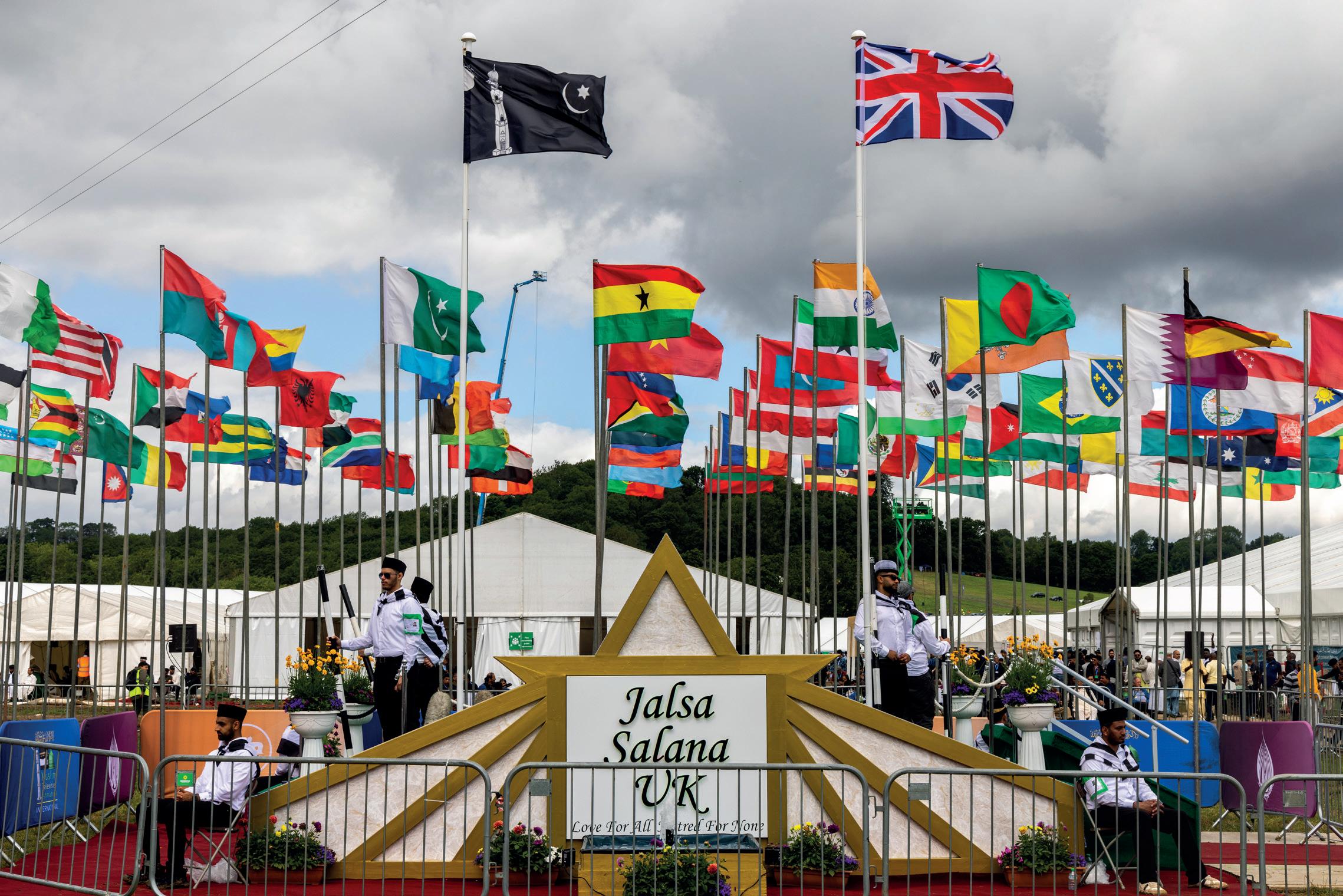
Despite the UK Jamaat’s extensive experience in organising Jalsa Salana, there are some concerns about accommodating over 40,000 people this year among the administration. However, Huzooraa remains optimistic, citing the expertise and devotion of the current generation. After inspecting the preparations on Sunday, Huzooraa felt confident in the dedication and familiarity of the duty holders with their responsibilities.
Huzooraa emphasised that success is not due to individual skills but the grace of Allah. He urged duty-holders to work with their best efforts and morals and to seek help through prayers. They should serve the guests of the Promised Messiahas selflessly. The duty holders should not only focus on their responsibilities but also on their spiritual connection and prayers.
Regarding the guests, Huzoor reminded them not to take his words lightly or customarily; rather, listen to them attentively and put them into practice.
The primary purpose of attending Jalsa Salana is not for worldly festivities but for spiritual, academic, and moral upliftment. With the right mindset, even if there are organisational shortcomings, guests would not be significantly affected. Attendees of the Jalsa Salana are again reminded that the event is not a worldly festival but a spiritual gathering with the aim of enhancing spiritual, academic, moral, and educational states. The purpose is to deepen the love for Allah and His Messengersa. Embracing this mindset helps attendees overlook organisational shortcomings.
The Jalsa Salana provides various opportunities, such as the Isha‘at bookstore as well as exhibitions by Makhzan-eTasaweer, Review of Religions, the Tabligh Department and Ahmadiyya Archive and Research Centre etc. for attendees to increase their knowledge of Jamaat’s history and improve their religious understanding.
The attendees are encouraged not to focus on material comforts but to immerse themselves in the proceedings of the Jalsa. Instead of shopping or wandering around, they should listen to the speeches and benefit from the various exhibitions, etc.
In terms of shortcomings, especially related to food, attendees are encouraged to be understanding and patient, bearing in mind that the workers are volunteers from different professions. The Promised Messiah’sas example of contentment in the face of service shortcomings serves as a guiding principle.
Guests are reminded that exhibiting high moral standards is everyone’s responsibility, not just the duty holders. Everyone, including women and men, should display the best behaviour, understanding that even a smile is considered a part of faith. The Promised Messiah’sas teachings underscore the importance of preferring the comfort of others over oneself. The true belief of a person is in giving precedence to the comfort of others, especially when faced with personal comforts or advantages.
The Jalsa Salana is not just a mere convention; it’s a spiritual gathering meant for reflection, self-improvement, and fostering brotherhood. By not adhering to these principles, you not only harm your own spirituality but also deprive others of the peaceful and enlightening atmosphere they seek.
It is important to understand that
the Promised Messiahas has given us this guidance not as a burden, but as a way to purify ourselves and our society. We must see it as a golden opportunity to uplift ourselves and those around us. If we let our egos, anger, and prejudices control us, then we are missing out on the immense blessings that come from following this divine advice.
Let us not waste our time on trivial disputes and disagreements. Instead, let’s invest our energy in building bonds of love, understanding, and unity. For every moment we spend in anger or resentment, we lose a precious moment that could have been spent in service.
So, as attendees and hosts of the Jalsa Salana, it is our collective responsibility to make these three days count. To ensure that the environment is charged with spirituality, love, and mutual respect. And if, at any point, we find ourselves faltering, we must remind ourselves of the beautiful teachings of the Promised Messiahas and reset our intentions.
Huzooraa also touched upon some general matters and emphasised the following points:
• All attendees should attentively listen to the proceedings of the Jalsa.
• It is imperative to listen to all the speeches; one should not pick and choose which ones to attend.
• The Promised Messiahas strongly
discouraged the act of favouring some speeches while neglecting others.
• Given that we are in the sacred month of Muharram, special emphasis should be on the remembrance of Allah and sending Durood upon the Holy Prophetsa
• We must particularly pray for the Holy Prophet Muhammadsa and his Ummah in general.
• Let us also keep all the Ahmadis facing persecution for their belief in the Promised Messiahas, who is the most ardent devotee of the Holy Prophet Muhammadas.
• Attendees, especially ladies with children, must instil in their offspring the significance of the Jalsa proceedings. They should ensure both they and their children listen with full concentration.
• Everyone should remain vigilant regarding security.
• It is of utmost importance that all issued instructions are read thoroughly and adhered to.
Huzooraa prayed, may Allah the Almighty enable everyone to benefit from the Jalsa in the best way, safeguard against every evil and shower us with His mercy and blessings. Amin
Friday 4 August 2023 | AL HAKAM 12
Photo courtesy AMA UK
Awwab Saad Hayat Al Hakam
As the Jamaat’s pioneer missionaries ventured out to spread the message of the Promised Messiahas as representatives of the Khalifatul Masih, they encountered various obstacles, including severe weather and enemy attacks, just to name a few.
What happened when the enemies attacked Abraham with fire and what occurred to those who believed in Noah and boarded the ark are incidents we are familiar with. It is the same God who saved His noble prophets and continues to care for those whom He loves. Those who have accepted the Holy Prophetsa of Islam and are completely obedient to him have also embraced the Messiahas he prophesied would come in the Latter Days.
Divine protection amidst adversity: Miraculous preservation of Ahmadiyya mission in Ba, Fiji

The Jamaat’s Missionary in Fiji, Sheikh Wahid Sahib, writes that in 1968, it was decided to establish a branch of the Ahmadiyya Mission in the renowned city of Ba in Fiji and purchase a suitable house for this purpose. However, he writes, strong opposition began in this city. Opponents of Islam Ahmadiyyat initiated efforts to prevent the success of this Islamic mission in the city of Ba and hinder its progress.
During that period, the leader of the opponents was a formidable individual named Abu Bakr Ko Ya. He, along with other opponents of the Jamaat, started openly declaring their intention to set fire to the Ahmadiyya mission building in Ba. Thus, with this danger on site, every possible measure was taken to ensure the security of the premises. He writes that they also informed the local police station about the situation, and they assured their vigilance and support.
One night, the opponents managed to find an opportunity to express their innate feelings towards Islam Ahmadiyyat. One of them set fire to a portion of the mission house by pouring oil. The opponents deemed that the fire would quickly spread throughout the wooden structure, causing extensive damage. As soon as the fire started, the arsonist fled the scene. However, by the grace of God, the fire miraculously extinguished itself without causing any harm.
Sheikh Wahid Sahib writes that the mission house was empty at that moment. Upon their return the following day, they discovered that a fire had been intentionally set on the side of the building, which was
Unyielding faith in the face of a storm of opposition: Divine protection witnessed by pioneer missionaries
A series looking at pioneer missionaries and devotees of the Ahmadiyya Muslim Jamaat who gave precedence to faith over the world.

predominantly made of wood. Some of the wooden areas were burnt, but fortunately, the fire had been extinguished before it could spread further. He added that on that very day, the damage was repaired.
During the inspection of the damaged area, the missionary in charge, Noorul Haq Sahib Anwar, stood in the burnt room and let out a deep sigh, expressing his sadness. He uttered the following words, “Whoever
the neighbourhood where Maulvi Ghulam Hussain Ayaz Sahib was residing. A fire broke out, rapidly spreading closer to his house. Upon witnessing this incident, members of the local Jamaat became greatly concerned. The nearby area was ablaze, and retrieving the belongings seemed challenging. However, the men present at the scene intended to somehow retrieve the goods. In such a scenario, Maulvi Ghulam
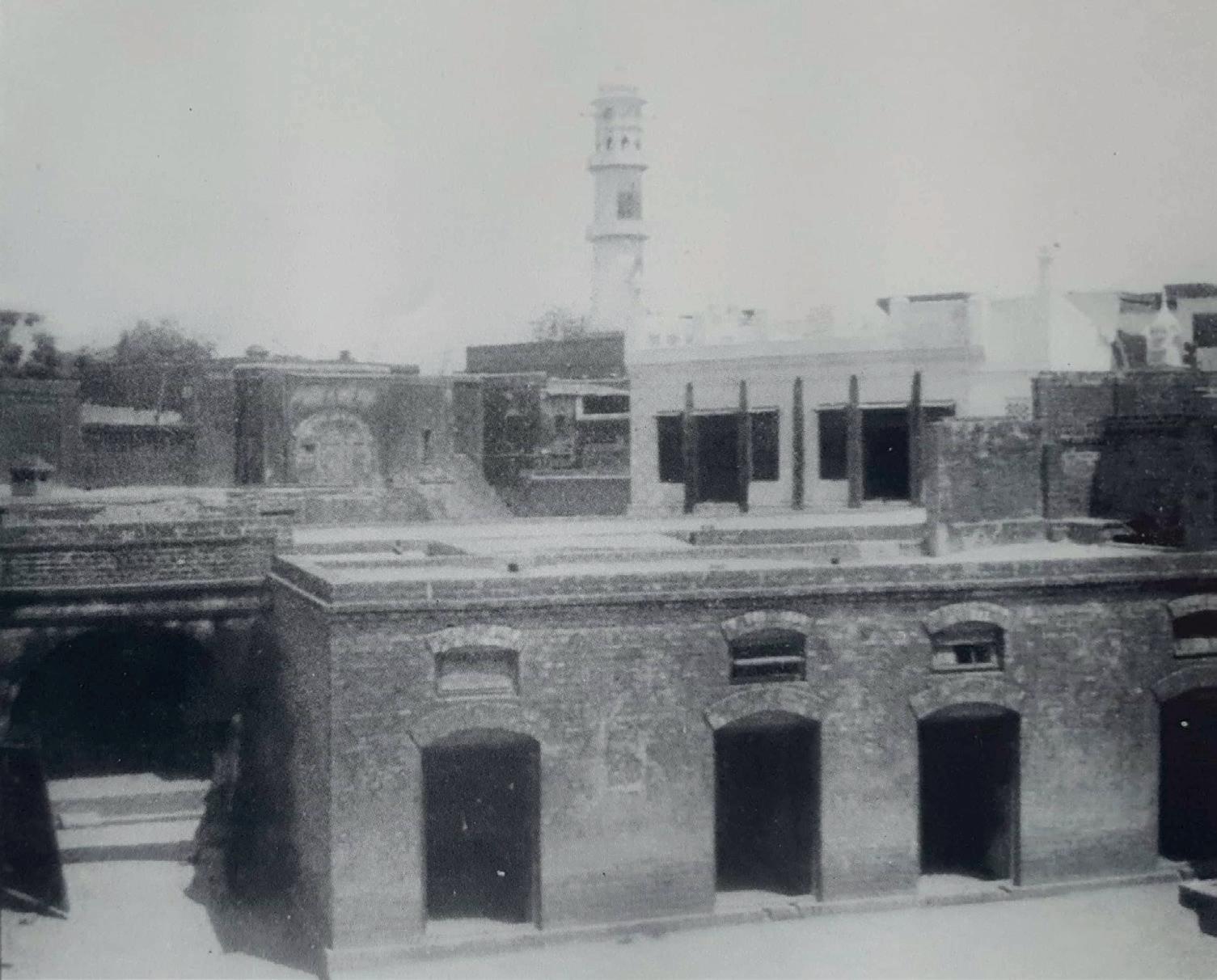
further mentioned that in 1972, his father, Ghulam Ahmad Farrukh Sahib, was dispatched to Fiji as a preacher. Unfortunately, he suffered a stroke during his time there. In light of his health condition, Hazrat Khalifatul Masih IIIrh advised him to return. According to the planned schedule, Munir Ahmad Farrukh Sahib states that they were present at Karachi Airport to receive him. Considering his situation, an ambulance was arranged as well. However, upon the plane’s arrival, Ghulam Ahmad Farrukh Sahib was not among the passengers who disembarked. Major Munir Ahmad Farrukh Sahib adds that communication methods in those times were not as advanced. And thus, when they contacted the airport authorities, they were informed that the plane had made a stopover in Singapore before reaching Karachi and that they would only be able to obtain further information the following morning.
attempted to set fire to this centre for the propagation of the religion of Islam, may God reduce their own house to ashes.”
As fate would have it, a few days later, the house of Abu Bakr Ko Ya, the leader of the opponents, unexpectedly caught fire in Ba. Despite all their efforts to extinguish it, his house was completely reduced to ashes.
(Ruh Parwar Yadain, Muhammad Sidique of Amritsar, pp. 94-95)
Hussain Ayaz Sahib forbade them, assuring them not to worry, and he added that the Promised Messiahas had once stated, “Fire is my servant, and a servant of my servants.”
“Fire
is my servant, and a servant of my servants”: Divine protection during war

Maulvi Ghulam Hussain Ayaz Sahib, a respected figure in the Jamaat, was among the dedicated and self-sacrificing missionaries who not only engaged in preaching but also bore their own expenses. He shouldered the responsibility of his financial burdens, relieving the Jamaat from any kind of financial obligation.
During the war between the British and the Japanese, as the British forces were retreating from Singapore, there was intense shelling from both sides. In the midst of this chaos, a shell exploded near
Just as Maulvi Sahib uttered those words, a miraculous event occurred; the fire abruptly changed its course, consuming the houses situated in front and behind, sparing only a few houses in the middle. Remarkably, much of the area remained unscathed, and the neighbouring houses were also kept safe from harm. (Al Fazl, 6 February 1946)
An example of great humility and unwavering faith
A lengthy article by Major Munir Ahmad Farrukh was published in Al Fazl on 23 July 2010. The author expresses the view that his grandfather, Hazrat Mian Ghulam Qadirra was from a place near Qadian and was the first member of his family to accept Ahmadiyyat. Two of his sons, Maulana Ghulam Ahmad Farrukh Sahib and his elder brother Hazrat Maulana Ghulam Hussain Ayazra, had the privilege of dedicating their lives.
The news of Ghulam Ahmad Farrukh Sahib’s health had deeply unsettled everyone. His absence from the expected flight has only added to the anxiety. Particularly, Major Munir Ahmad Farrukh Sahib writes that his mother, while concealing her grief, remained engrossed in prayers. Witnessing her yearning, they, as siblings, also joined her in fervent supplication. The night was spent in prayer. Major Munir Ahmad Farrukh Sahib states that the next morning, his mother sat by the outer door, waiting, as if certain that someone would arrive. As someone knocked at the door, the mother hastened to open it, firmly believing that it could be none other than her husband. Major Munir Ahmad Farrukh Sahib states that he witnessed that his father’s feet were unsteady due to his health condition. His health conveyed a powerful message that even if similar situations were to occur a hundred times, where he would have to sacrifice wealth, life, and children, he would still believe that the debt of righteousness has not been fully repaid.
Major Munir Ahmad Farrukh Sahib added that tears welled up in his father’s eyes as he looked at his family. Ghulam Ahmad Farrukh Sahib said that he arrived in Karachi at night and spent the night at Ahmadiyya Hall Karachi. In his hand, he held an old, small bag that he had brought with him from Pakistan. Major Munir Ahmad Farrukh Sahib said that the family assumed that the remaining luggage would be in the taxi. As they quietly ventured outside with the intention of retrieving them, Ghulam Ahmad Farrukh Sahib gently remarked, “This is all I have in my hand.”
This humble soul made his stopover in
13 AL HAKAM | Friday 4 August 2023
Pioneer Missionaries
Part XI
Major Muneer Ahmad Farrukh Sahib
Continued on next page >>
An old view of Qadian | Image: library
Key to the success of Muslims
Hazrat Musleh-e-Maud’s address at a reception in Lahore, 1949
Ata-ul-Haye Nasir
Al Hakam
Towards the end of 1948, two representatives of the Grand Mufti of Palestine visited Pakistan – namely, Sheikh Abdullah Ghausiah and Syed Selim al-Husseini. Various dignitaries organised receptions in their honour. One such reception was held by Begum Salma Tasadduq Hussain – MLA West Punjab – on 3 January 1949, in Lahore. Hazrat Musleh-e-Maud, Mirza Bashir-udDin Mahmud Ahmadra, was also invited there to deliver a speech.
During his speech, Huzoorra said that the major shortcoming of contemporary Muslims is that they act without any plan or scheme, whereas, if they really wish to succeed, they are required to take every step with complete wisdom and according to a certain scheme. (Al Fazl, 4 January 1949, p.
1)
The Civil and Military Gazette reported:
“Our Great Shortcoming
“Up Till Now We Have Been Working Without a Plan — Ahmadiyya Head
“‘Our great shortcoming is that up till now we have been working without a plan.
If we really want to achieve something, we must act according to a plan,’ said Mirza Bashiruddin, Ahmadiyya religious head, at a reception given in Lahore on Monday afternoon by Begum Salma Tasadduq Hussain in honour of Sheikh Abdullah Ghausiah and Syed Selim al-Husseini, representatives of the Grand Mufti of Palestine.
“Speaking at the same function, Begum Tasadduq Hussain said: ‘No doubt Ka’aba is our centre, but the seat of Masjid-iAqsa (Palestine) is no less important to us spiritually. A Jewish State in the MiddleEast shall be a dagger thrust in the heart of Islam. We assure the Palestinians that Pakistan shall always be ready to help them in their noble cause.’
“‘Geographically, we occupy one continuous stretch of land. Our unification shall bring in a new era of peace in this war-torn world; for Islam means peace and stands for peace,’ she added.
“Sheikh Abdullah Ghausiah, speaking after Begum Tasadduq, said: ‘The friendliness with which we were received everywhere in Pakistan, has given us a new spirit, and has made us confident of our success.’
“‘God created in you a man [referring to MA Jinnah] who brought in existence the largest Islamic State. He is no more now, but his spirit lives, and his message rings in the ears of Mussalmans. Keep alive the flame he has lit,’ he added.
“Syed Selim al-Husseini, who followed, said: ‘Palestine is the backbone of the Islamic world, and it is the duty of all Muslims to make a united effort for redeeming the Holy Land. We are determined to liberate Palestine and, by the grace of God, we will succeed.’
“Sardar Mohammad Ibrahim, head of the Azad Kashmir Government, said that he had full sympathy with his Palestinian
brothers, and hoped that the Muslims of Jammu and Kashmir would do everything to help them as soon as they were free from their own problems.
“Prominent among those who attended the reception were Mr Ghazanfar Ali Khan, Mr and Mrs Doolittle, Mr Fida Hussain and Sirdar Abdul Hamid Dasti. — Star.” (The Civil and Military Gazette, 4 January 1949, p. 6)
The same newspaper, in its 5 January 1949 issue, published a photograph in which Hazrat Musleh-e-Maudra and Raja Ghazanfar Ali Khan – a well-known politician of British India and diplomat of Pakistan – can be seen having a discussion.
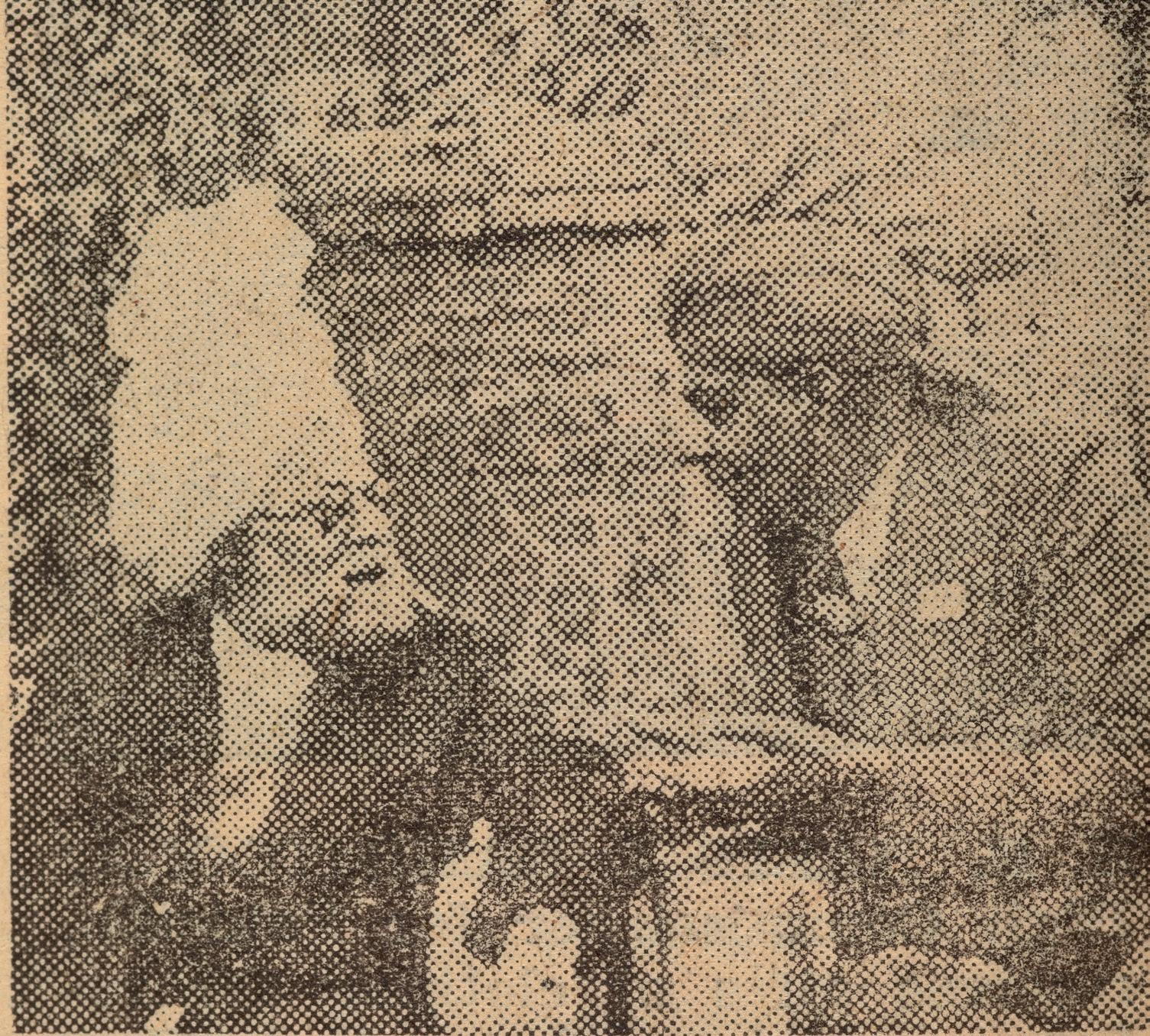
<< Continued from previous page
Singapore with the aim of meeting those Ahmadis who had joined Jamaat after the preaching of his brother when he was stationed there and was able to make a big Jamaat.
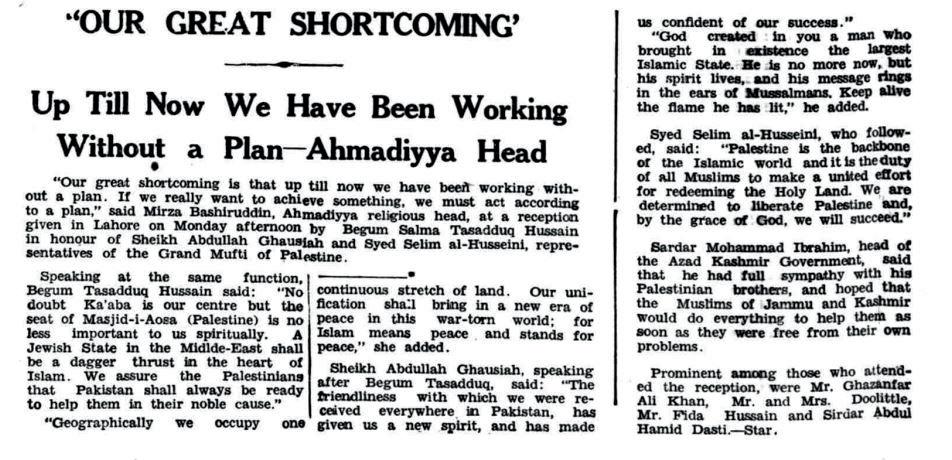
The miraculous storm: A testament to faith and Divine intervention
Among the early preachers of the Jamaat, we find the notable figure of Hazrat Maulana Ghulam Rasool Rajekira who dedicated his entire life to the propagation of Ahmadiyya. He had the privilege of spreading the message of the Promised Messiahas throughout the Indian subcontinent. While he was not sent to regions beyond Pakistan and India, his preaching services had a significant impact
and encompassed a wide range of areas.
Hazrat Maulana Ghulam Rasool Sahib Rajekira mentioned that Chaudhry Nithe Khan Sahib, who was a sincere Ahmadi, organised a preaching meeting in his village. He extended invitations to Ahmadi friends residing in the vicinity, urging them to participate in this gathering. The gathering was planned to span two days. Upon learning about this gathering, non-Ahmadis of the area, known for their slanderous and abusive remarks, including their clerics, also became aware of the event. They, in turn, set up their own canopy and erected a stage near the local jamaat’s jalsa place, where they initiated their customary series of insults directed towards Islam Ahmadiyyat.
The opponents began uttering profanities and engaging in blasphemy. Then, within a few minutes, a powerful wind emerged from
one side, and this storm veered towards the opposition’s gathering. The gust was so strong that their canopy was lifted and carried away, while the structures collapsed and scattered in different directions, resulting in complete chaos and the failure of their plan.
The Jamaat’s gathering was scheduled to commence after twelve o’clock. The storm persisted. Hazrat Maulana Ghulam Rasool Sahib Rajekira stated that as he went to deliver his speech, he humbly requested everyone in attendance to pray that Allah grant success to their gathering in every respect.
Therefore, he said, he raised his hands, along with all those present, and prayed fervently before the Almighty. He said that he prayed fervently to God saying that God promised in the Holy Quran that
sincere believers and the transgressors and disbelievers cannot be equal. The nonAhmadi gathering had no purpose other than to mock and deny the Promised Messiah, while the Jamaat’s purpose was solely to affirm and uphold the Messiah of the age. He prayed to Allah to demonstrate the difference through this storm and command the angels who control it to cease, so that the Jamaat may proceed with the proceedings of the gathering and elevate the word of Allah.
Suddenly, the wind ceased, gradually transforming into a gentle, cool breeze that eventually subsided completely within a matter of minutes. This cessation of wind had a profound impact, affecting both the adversaries and members of the Jamaat present. (Hayat-e-Qudsi, Part III, pp. 26-27)
Friday 4 August 2023 | AL HAKAM 14
Rare photo of Hazrat Musleh-e-Maudra | Raja Ghazanfar Ali Khan having a discussion with Huzoorra, 3 January 1949, Lahore
The Civil and Military Gazette, 4 January 1949
Love for All, Hatred for None What it means for Ahmadi Muslims
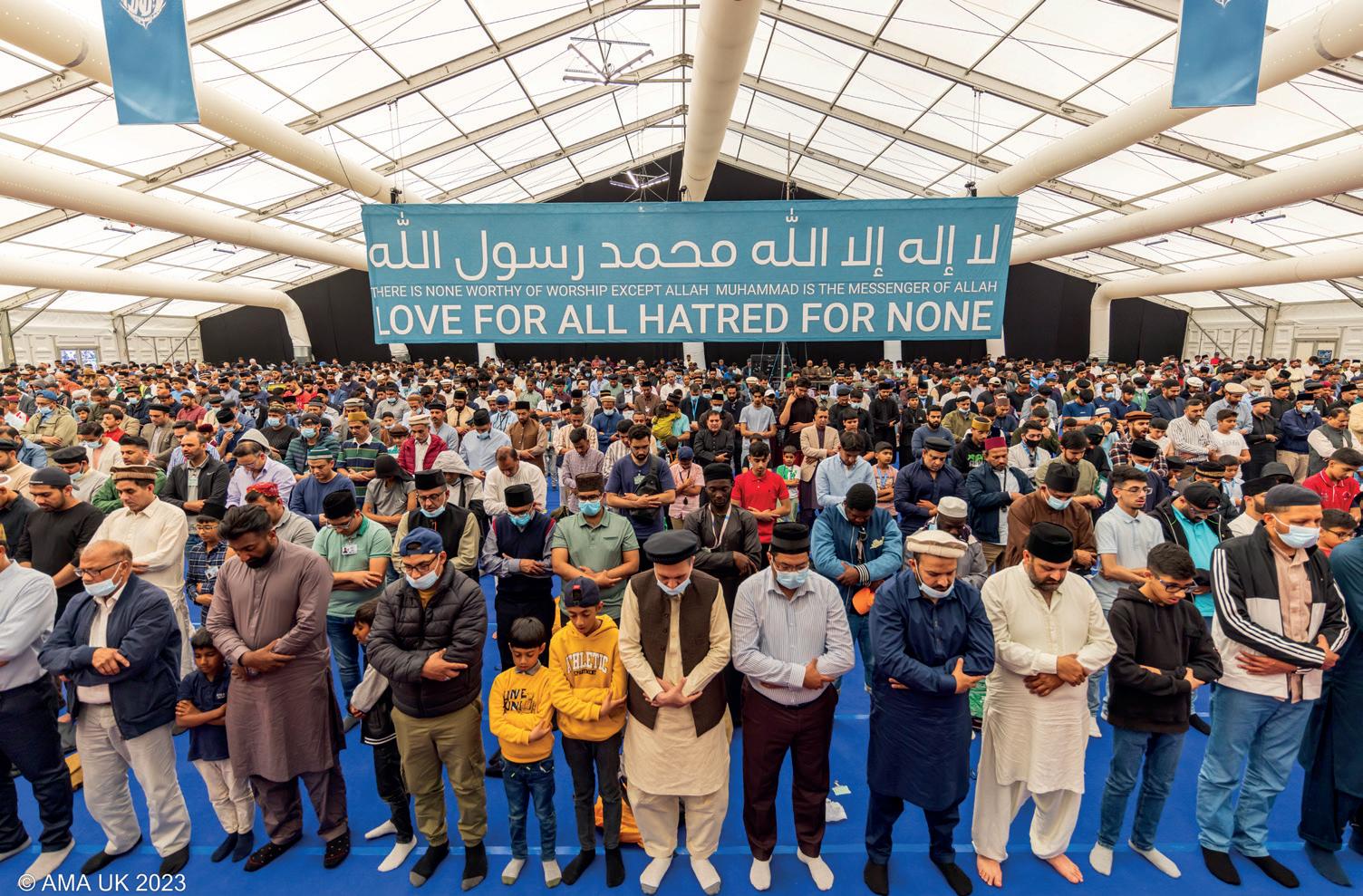
Jazib Mehmood Jamia Ahmadiyya International Ghana
Last week, the Ahmadiyya Muslim Community in the UK held its 57th Annual Convention in Hampshire. And although it is held in the UK, it has blossomed into an international convention that is attended by Ahmadis all over the world due to the presence of the head of the worldwide Ahmadiyya Muslim Community, Hazrat Khalifatul Masih Vaa
Whether you attended the convention in person, or watched it live from home, you will most likely have seen or heard the famous slogan of the community: Love for All, Hatred for None
In this short piece, we will dive a bit into its history and find out what this slogan means.
History of an Ahmadiyya motto
It was in 1936 that Hazrat Khalifatul Masih IIra first addressed the idea that had sprouted among the scholars of the Jamaat that the Jamaat should have a motto. Some scholars had suggested verses of the Holy Quran like:
“Vie, then, with one another in good works.” (Surah al-Ma’idah, Ch.5:V.49) On the other hand, some had advocated for Urdu phrases like “I shall give precedence to my faith over the world”.
In his Friday Sermon on 28 August 1936, Hazrat Khalifatul Masih IIra spoke about how the motto of the Jamaat could not be any one verse of the Holy Quran, since the entire Quran was a source of guidance for us.
Instead, he explained that the true motto of the Jamaat is the shahadah:
Meaning that there is none worthy of worship except Allah and Muhammad is His Messenger. This, he stated, proclaimed the Unity of God, and combined within it all the commandments of the Holy Quran. (Khutbat-e-Mahmood, Vol. 17, p. 564)
The slogan “Love for All, Hatred for None” was bestowed on the Jamaat by Hazrat Khalifatul Masih IIIrh, who first voiced the words in Spain. Addressing a large congregation at an event where Huzoorrh laid the foundation stone of the first mosque in Spain in 700 years, he stated:
“Islam teaches us to live with mutual love and affection and with humility. It teaches us no distinction between a Muslim or a non-Muslim. My message to everyone is that you must have ‘Love for All, Hatred for None!’” (The Review of Religions, March 2008, p. 52)
Since then, the Jamaat has adopted these words as its slogan. Explaining the meaning of these words, Hazrat Khalifatul Masih Vaa states:
“We also use this slogan [i.e., Love for
All, Hatred for None] to make it clear to the world that Islam teaches love, peace, and kindness, and it is not correct to associate cruelty and viciousness with the faith of Islam. We employ this slogan to signify that we wish to live together by breaking down walls of hatred.
“When we serve humanity in any way at all or when we disseminate the message of Islam, we do so because we have love for every person in the world, and we wish to remove hatred from each heart and instead sow the seeds of love. We do so because this is what our master, the Holy Prophetsa taught us.” (Friday Sermon, 9 May 2014; Al Fazl International 30 May 2014, Vol. 21, Issue 22, p. 5)
How can we love everyone?
Some people raise the question of whether it is possible to love everyone since there are many bad people in the world. There are many people for whom Allah the Almighty has also clearly stated in the Holy Quran that He does not love them.
In this regard, the Promised Messiahas beautifully explains that we must hate their actions but not their persons. Explaining the teachings of Islam in this regard, he states:
“The Quran does not encourage you to love your enemies. Rather, it teaches you to dissolve your personal enmities and show compassion to everyone. But, those who oppose God, your Messenger[sa], and the Book of Allah are certainly your enemies.
“However, even then, you ought not to exclude them from your prayers and supplications. Oppose their actions, not their persons, and seek to rectify their deeds.” (Noah’s Ark, p. 50)
Further elucidating this Islamic teaching, the Promised Messiahas states in another place:
“If it is asked that when it is forbidden to love Satan and those of satanic character, how then should we treat them? The reply to it is that the Holy Word of God, the Holy Quran, instructs us to be extremely compassionate towards them, in the same way as a kind-
hearted person shows compassion towards the leper, the blind, the handicapped, etc., all those who are suffering. […]
“It is the sign of a truly compassionate person that he does not always treat the pitiable person with gentleness, but takes appropriate action concerning him as dictated by the need of the time and circumstance – at times being gentle and at times being strict. […]
“Therefore, the true purport of the Quranic teaching is that love, the reality of which is to become coloured in the hues of the beloved, is permitted only when it is for God and for righteous people and is otherwise strictly forbidden.” (The Light of the Holy Quran – Number Two, pp. 132-135)
“All I say to you is: be true”
Once, an Ahmadi asked Hazrat Khalifatul IVrh how we can love everyone when there is so much evil in this world. Huzoorrh gave the following beautiful reply:
“I think I agree with you that this noble adage is not for everyone to follow. We must follow [the] truth. Some of us cannot suppress our hatred against evil, and as such, they are forgiven – they are excused. And there shouldn’t be any artificiality in Ahmadi sentiments. Just because we write this slogan largely on different walls or banners doesn’t mean that we change our nature and become false. […]
“The point is, you should not hate anybody just because of racial differences, religious differences, or any general views. But personally, if somebody is evil – and you know him to be an evil person – I don’t see [how] anybody can help hating him, because man hates evil. If somebody commits a very grave crime against a poor innocent child, I don’t see how an Ahmadi can love him and say, ‘Love for All, Hatred for None’. […]
“It doesn’t mean that you must love Satan as well or evil personified. What [the motto] means is that, initially, this is our attitude towards everybody. This is our message to the whole [of] mankind: We are here to love you, not to hate you. But if
somebody behaves in a manner that [makes it] impossible for us to continue to love him, then [we] must be forgiven [for not loving such a person].
“All I say to you is: be true. Be honest. Honestly try – again I say to you – honestly try to love everyone.” (Question & Answer Session 24 June 1991)
Responsibility of an Ahmadi Muslim
In his Friday Sermon on 9 May 2014, Hazrat Khalifatul Masih Vaa also explained in great detail that our true motto, the root of all our endeavours, is the shahadah. Huzooraa addressed the community in the following words:
“We should not feel smug by merely raising slogans that the world appreciates and through which we are praised in various places. We should be mindful that this slogan is just one source for attaining the broader objective for which man was created. Our humanitarian works, our promotion and practice of love, our rejection of hatred, and our hatred for hatred itself are to attain God’s love and to establish the Unity of God. […]
“This slogan is in fact a means to an end, the end being the objective of our lives. It is a stepping stone towards the objective for which the advent of the Holy Prophetsa took place, and then, in his subservience, the Promised Messiahas was sent by God in the current age to attain the objective. And that objective is to instil true insight into the Unity of God and to try to practise all of God’s commandments. […]
“Thus, we should not just shout or express slogans to become popular in the eyes of the world, but shout this slogan to achieve our goal. […]
“It should be remembered that all Quranic commandments are excellent and beneficial in their own right, but ہللا ا إ ہلإ ال is dominant over them all. This is the real motto, which we need to keep in sight at all times, and we need to reflect on the need for the Unity of God and its establishment. […]
“Thus, our motto, which is appointed by God, is, ہللا الإ ہلإ ال, the rest are all details that can be useful as advice.” (Friday Sermon, 9 May 2014; Al Fazl International 30 May 2014, Vol. 21, Issue 22, pp. 6–8)
The teaching of the Holy Quran proclaimed in the words “Love for All, Hatred for None” is such a vital one that it resonates with even non-Muslims today. It is a need of the time that drives Ahmadis to shout it from the rooftops.
But at the same time, we constantly remind ourselves that our end goal is to establish the Unity and Oneness of Allah the Almighty in the world. And this, dear reader, is why when you saw the banner that proclaims “Love for All, Hatred for None” at Jalsa Salana this year, you must also have seen the shahadah on the same banner.
15 AL HAKAM | Friday 4 August 2023
تریخلا اوقبتساف
ہللا لوسر دمحم ہللا الإ ہلإ ال
Medicine, Science, Learning, Innovation and Mentorship Conference 2023 held in USA
 Shazia Sohail Secretary Ishaat, Lajna Imaillah USA
Shazia Sohail Secretary Ishaat, Lajna Imaillah USA
The Medicine, Science, Learning, Innovation and Mentorship Conference was held between 1-3 July 2023, at the JW Marriott Bonnet Creek in Orlando, Florida, USA. This was probably the first-of-its-kind meeting, hosted by the Ahmadiyya Muslim Medical Association (AMMA), Ahmadi Women Scientists Association (AWSA), and Association of Ahmadi Muslim Scientists (AAMS). With over 50 sessions and 27 poster presentations attended by more than 250 people, this conference offered a broad range of topics from cutting-edge research to career paths, with the goal of connecting rising and experienced professionals in the field of science and medicine across the country to perform their work in light of the teachings of the Holy Quran.
Dr Nadia Malik Sahiba, Nazima-e-A‘la of this conference, said:
“Alhamdulillah, the event exceeded all expectations, and we have received very positive feedback. It has been humbling to see, in particular, the 13-35 age group so engaged, comfortable, and excited to learn together. Overall, it has been very
encouraging and a step in the right direction as we set the pace for future events and conferences.”
Dr Shanaz Tejani-Butt Sahiba, Nazima Programme, MSLM23, said:
“Three professional organisations had to collaborate ultimately to come up with an integrated conference. The goal was to generate interest and create content for heterogeneous audiences. […] The first day of the event was all about passion for service. As I walked around the venue and engaged in the sessions, I could feel the electricity and the energy. The second day was about connecting our scientific knowledge with the teachings of the Holy Quran. Our speakers shared their personal career journeys and highlighted the direct impact their work has on the overall betterment of humanity. We also created time and opportunities for attendees to be able to interact and seek mentorship on Day 2. […] The third day was focused on broader, high-level topics to showcase the diverse industries and the scope of impact our fellow Ahmadis are driving and contributing to. Overall, from a programmatic point of view, I believe the audience learned a lot, and the quality of presentations and sessions exceeded
expectations each day.”
Dr Nusrat Sharif Sahiba from AWSA USA said:
“As far as I know, this was the firstever meeting between our three Ahmadi professional associations: AWSA, AMMA, and AAMS, and it truly was a unique event in terms of organisation, agenda, and venue.”
Azhar Haneef Sahib, missionary-incharge USA, said:
“The conference was excellently organised, and there was a truly great collaboration between seasoned medical
Jamaat events held by auxiliaries in Ivory Coast
Shahid Ahmad Masud
Regional Missionary Bondoukou, Ivory Coast
Khuddam ijtema and tarbiyati class
Majlis Khuddam-ul-Ahmadiyya Bondoukou, Ivory Coast, arranged their first annual regional ijtema and second tarbiyati class for khuddam and atfal from 21 to 23 July 2023 at Baitul Ahad Mosque.
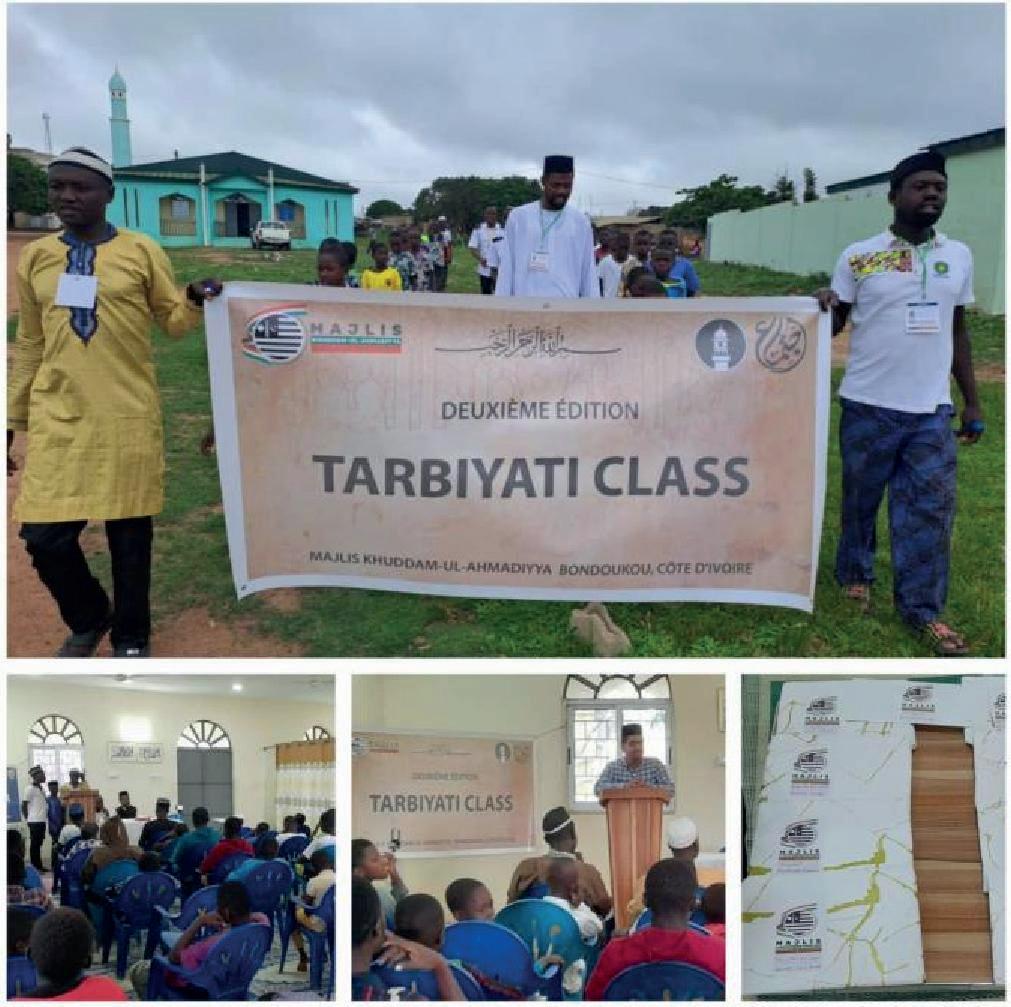
After the Asr prayer, the tarbiyati class commenced with the recitation from the Holy Quran. I had the honour of delivering a speech at the event.
The focus of the class was to enhance the spiritual and physical capabilities of the khuddam and atfal. A total of 52 participants were present in the class.
The ijtema started with the recitation from the Holy Quran, followed by the Khuddam-ul-Ahmadiyya pledge, an Urdu poem, and a speech by the local missionary, Sawadogo Ahmad Sahib.
During the concluding session of the tarbiyati class and ijtema, prizes were
distributed among the top performers of different academic and sports competitions. A silent prayer concluded the event.
Lajna tarbiyati class and Jalsa Seerat-un-Nabi
Lajna Imaillah Bondoukou, Ivory Coast, organised its first tarbiyati class and Jalsa Seeratun-Nabi on 22 and 23 July 2023. The tarbiyati class started with a recitation from the Holy Quran. The class consisted of two parts: education and sports. Two documentaries were played for members on television. Participants of the class also visited the museum in Bondoukou.
On 23 July 2023, Jalsa Seerat-un-Nabi was held, which started with the recitation from the Holy Quran with French translation, followed by a hadith and a poem. Afterwards, two
speeches were delivered in French on the blessed life of the Holy Prophetsa and his relationship with Allah the Almighty.
A non-Ahmadi guest was also present at the jalsa. The event concluded with a silent prayer.
professionals, students, and diverse scientists. We created great synergy between our youth and elders, and inshaAllah together we can continue to build a prosperous future.”
Sister Dhiya Bakr Sahiba, Sadr Lajna Imaillah USA, expressed that this event was exhilarating, enlightening, and inspirational. “Alhamdulillah and masha-Allah, this event has got me energised and thinking ahead about all the wonderful things we can accomplish together. This is just a stepping stone; this was just the beginning.”
Interfaith seminar held by Lajna Imaillah Bangladesh
Atiyatul Ohid
Convener, Centenary Celebration Implementation Committee, Lajna Imaillah Bangladesh
Lajna Imaillah Bangladesh held an interfaith seminar on 10 July 2023, at the Darut Tabligh Mosque complex in Dhaka, as part of its centenary celebrations. Sadr Lajna Imaillah Bangladesh, Rehana Khair Sahiba, presided over the gathering.
42 non-Ahmadi guests and 185 Ahmadis attended the event. In the context of their respective faiths, the eminent representatives of the Hindu, Christian, Buddhist, and Islamic faiths offered thought-provoking lectures.
The distinguished guests included Supriya Bhattacharya, President of Bangladesh Mahila Oikya Parishad; Sister Reba Veronica D’Costa, RNDM, CoCoordinator Inter-Religious Dialogue Commission, Banga Maha Dharmapadesh; Professor Dr Niru, Chairman of the Department of Pali, University of Dhaka; and Roshan Jahan Sahiba, Naib Sadr Lajna Imaillah Bangladesh.
Friday 4 August 2023 | AL HAKAM 16
Photo courtesy AMJ Ivory Coast
Unsplash | Ousa Chea
Friday Sermon
Mubarak Mosque, Islamabad, Tilford, UK
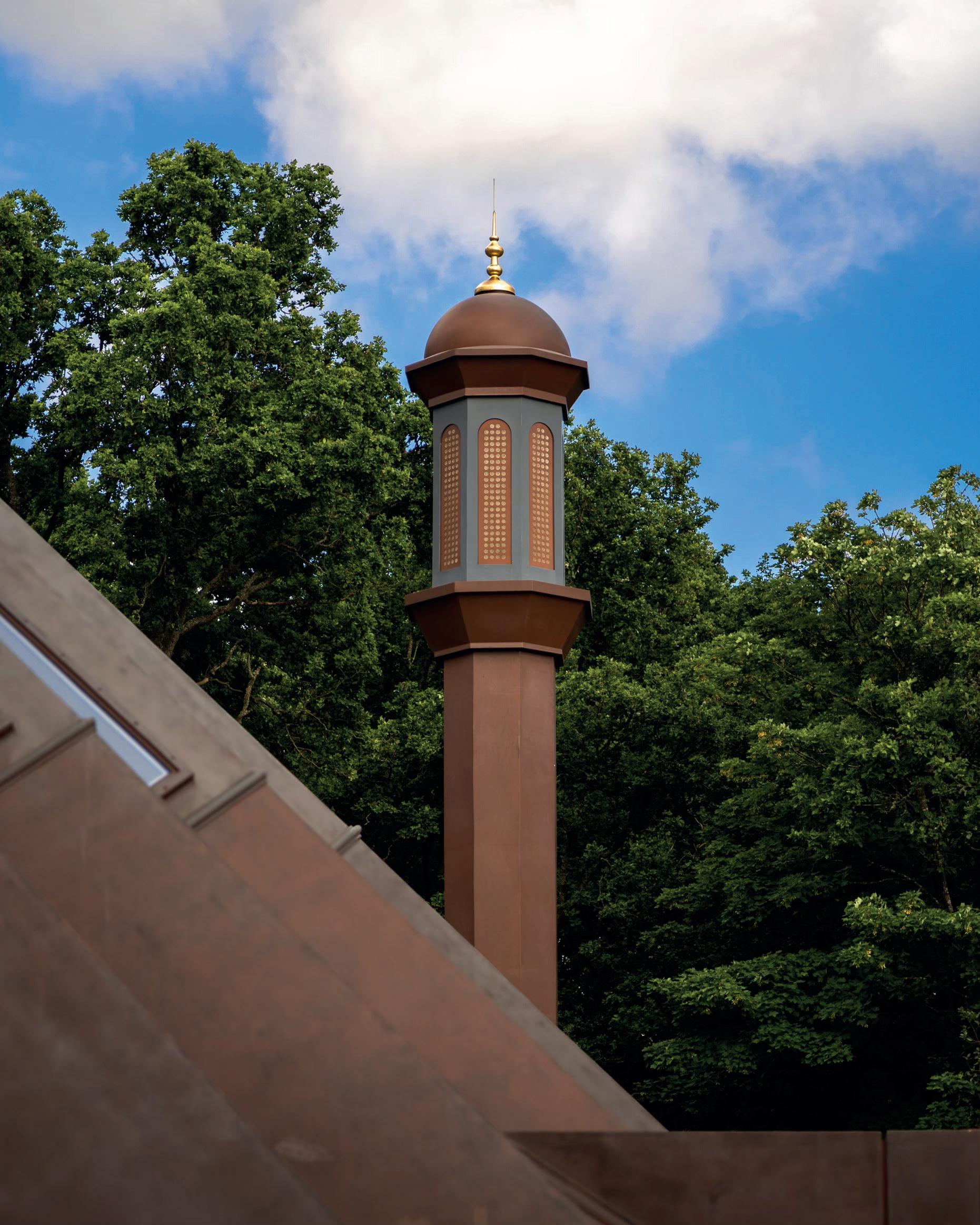
7 July 2023
Muhammadsa: The great exemplar
After reciting the tashahhud, ta‘awwuz and Surah al-Fatihah, Hazrat Khalifatul Masih Vaa stated:
In the previous sermon, whilst mentioning an incident of the disbelievers of Mecca being overawed by the Muslims was related, it was stated that a disagreement between Abu Jahl and ‘Utbah ensued regarding the battle. Upon hearing the taunts of Abu Jahl, ‘Utbah declared that he would take part in the war and hence a battle commenced. In the details regarding this, it is written that ‘Utbah bin Rabi’ah set out, walking between his brother, Shaybah bin Rabi’ah, and his son, Waleed bin ‘Utbah. They crossed all the ranks and asked for a duel. (Ibn Hisham, AlSirah al-Nabawiyyah, p. 246, Dar al-Kutub al-‘Ilmiyyah, Beirut, 2001)
Hazrat Alira relates that ‘Utbah bin Rabi’ah stepped forward, followed by his son and brother, and asked who would fight him. Some young men from the Ansar [Muslims native to Medina] answered his call. ‘Utbah asked the Ansar who they were. They told him who they were. ‘Utbah replied to them: “We are not concerned with you! We only seek to fight our uncle’s sons.” Meaning that he only wanted to fight the Quraish, the people of Mecca and not the Ansar! He then loudly proclaimed: “O Muhammad! Send forth our equals from among our relatives in order to fight us!” Upon this, the Holy Prophetsa said: “O Hamzah, step forward! Arise, O Ali! Go forth, O ‘Ubaidah bin Harith!”
Hazrat Hamzahra was the paternal uncle of the Holy Prophetsa and Hazrat Ali and Hazrat ‘Ubaidah were his paternal cousins. Hazrat Alira says: “Hamza marched towards ‘Utbah, I advanced towards Shaybah. Hazrat ‘Ubaidah and Waleed fought each other fiercely, and both of them had wounded and weakened the other. Following our respective duels, we turned towards Waleed. We killed him and picked up Hazrat ‘Ubaidah and brought him back.”
(Sunan Abu Da’ud, Kitab al-Jihad, Bad fi al-Mabarazah, Hadith 2665; Al-Lu’lu alMaknun, Sirat Encyclopedia, Vol. 2, p. 48, Maktabah Dar al-Islam, Riyad, 1433 AH)
Hazrat Hamzahra and Hazrat Alira had
already killed their opponents. When Hazrat Hamzahra and Hazrat Alira brought their companion, Hazrat ‘Ubaidah, back into their army, his foot had already been severed. When he came before the Holy Prophetsa, he said: “O Messengersa of Allah! Am I not a martyr?” The Holy Prophetsa replied: “You are certainly a martyr!”
(Tarikh at-Tabari, Vol. 2, p. 32, Dar alKutub al-‘Ilmiyyah, Beirut, 2012)
Hazrat ‘Ubaidah, the paternal cousin of the Holy Prophetsa, could not recover from these wounds and passed away on the journey back from Badr. (Sirat Khatamun Nabiyyin, p. 360)
Regarding Hazrat ‘Ubaidahra bin Harith, it is mentioned in a narration that when his foot was severed by the sword, his comrades carried him back. When he was brought to the Holy Prophetsa, he was placed beside him. The Holy Prophetsa placed his blessed foot under Hazrat ‘Ubaidah’sra foot and with an expression of love, ‘Ubaidah looked to the Holy Prophetsa and said: “O Messengersa of Allah! If Abu Talib were alive today, he would know that I am most entitled to his words.” Following this, he recited couplets of Abu Talib, the translation of which is as follows:
“By the House of Allah! You lied that Muhammadsa would be left alone. Until now, we have not even defended him with our spears or arrows. You have lied that we will hand him over to you. For this, you will have to walk over our corpses, a time when we would be heedless of even our own sons and daughters!” Hearing this, the Holy Prophetsa said: “I am a witness that indeed you are a martyr!” (Subul al-Huda wa alRashad, Vol. 4, pp. 35-36, Dar al-Kutub al‘Ilmiyyah, Beirut, 1993; Usd al-Ghabah, Vol. 3, p. 548, Dar al-Kutub al-Ilmiyya, Beirut)
There is mention of a prayer of Abu Jahl on this occasion. When the two armies faced one another, in other words when the full-scale battle was about to commence, Abu Jahl prayed, “O God, today, destroy the one among us who breaks the ties of
kinship and speaks of that which we have never heard of.” (Sirat Ibn Hisham, p. 428, Dar al-Kutub al-‘Ilmiyyah, Beirut, 2001)
In relation to this, the Promised Messiahas writes:
“During the Battle of Badr, a man named Amr bin Hisham – who later came to be known as Abu Jahl and was the chieftain and ringleader of the Quraish – prayed in the following words:
“‘O God, whoever among us (referring to himself and the Holy Prophetsa) in Your estimation is the most rebellious of our people, is causing disunity, and is becoming the means of breaking the ties of kinship by severing familial bonds and depriving the people of their rights, destroy him today.’
“What Abu Jahl meant by these words was that God forbid, the Holy Prophetsa was a mischief-maker, who has caused tensions among the people, and that he was unjustly creating discord within the religion of the
17 AL HAKAM | Friday 4 August 2023
of Suhaib Ahmad
Photo courtesy
مویلا ہنحاف محرلِل عطقا و موقلا یف دسفا انم ناک نم مہللا
Quraish, and that He had violated all the rights of the people and became the means of cutting ties of kinship. It seems that Abu Jahl was certain that, God forbid, the life of the Holy Prophetsa was unholy and impure. It was then that he made the heartfelt prayer, yet he was unable to live, perhaps even an hour after making this prayer and the wrath of God struck him and cut his head off in that very place. On the other hand, the one whose pure life he used to slander emerged from that battlefield victorious.” (Chashmae-Ma‘rifat, Ruhani Khazain, Vol. 23, pp. 174-175)
Scenes of the battle have been described in one place as follows:
“Now, the field of battle was heated by bloodshed. Before the Muslims was a party three times their number, which had entered the field of battle, embellished with all kinds of military equipment, determined to erase all traces of Islam. The poor Muslims were fewer in number, less equipped and struck by shocks of poverty and exile, and as far as apparent means were concerned, they were prey of a few minutes before the people of Mecca. However, they had become intoxicated by the love of Divine Unity and Prophethood. Living faith is a power in comparison to which there is no greater power on earth, and it had instilled within them a supernormal strength. At that time, in the field of battle, they were displaying an unparalleled example of service to the faith. Every man would step ahead of the other, and seemed restless to offer his life for the sake of God. Hamzahra, Alira and Zubairra cut down rank upon rank.” (The Life & Character of the Seal of Prophetssa, Vol. 2, pp. 151-152)
It is recorded regarding the first martyr among the Muslims that Hazrat Mihjahra, the freed slave of Hazrat Umarra, was made a target of arrows and was thus martyred. He was the first among the Muslims to embrace martyrdom [in the battle]. Thereafter, Hazrat Harithah bin Suraqahra, a person from among the Bani Adiyy bin Najjar tribe, attained martyrdom. He was drinking water from a reservoir when an arrow was shot in his direction, which hit him in his neck, resulting in his martyrdom. (Sirat Ibn Hisham, p. 428, Dar al-Kutub al-‘Ilmiyyah,
Beirut, 2001)
Hazrat Anasra relates that Harithah bin Suraqah bin Harithra was martyred in the Battle of Badr whilst he was still in his youth. His mother, Rabi’ah bint Nazar, the aunt of Hazrat Anasra, went to the Holy Prophetsa and said, “O Messengersa of Allah, you know full well the regard I had for Harithahra. If he is in Paradise, I shall remain patient and hope for reward, but if it is anything other than this, then you will see what I shall do.” The Holy Prophetsa replied, “Alas! Have you gone mad? Is there only one paradise?” The Holy Prophetsa then said, “There are many paradises, and your son is in Jannah al-Firdaus.” (Sahih al-Bukhari, Kitab al-Maghazai, Bad Fazl Man Sahida Badran, Hadith 3982; Tabaqat al-Kubra, Vol. 3, p. 387, Dar al-Kutub al‘Ilmiyyah, Beirut, 1990)
It is written in relation to the passion and resolve displayed by the Companions for Jihad, that the Holy Prophetsa said, “Whoever fights today with patience and deeming it a reward, without fleeing, God shall make them enter paradise.” When Umair bin Humam of the Banu Salamah heard this, he had some dates in hand, which he was eating at the time. Hearing this, he said, “How excellent is this! The only thing between me and paradise is if these people kill me.” He then picked up his sword and fought until he was martyred. Auf bin Harithra, son of Afra’, asked the Holy Prophetsa, “O Messengersa of Allah, what action of His servant pleases Allah Almighty?” He answered, “To slay an enemy without wearing armour.” Upon this, he removed all his armour and threw it away, and after slaying many disbelievers, he was martyred. (Sirat Ibn Hisham, p. 428, Dar al-Kutub al-‘Ilmiyyah, Beirut, 2001)
In a narration of Sahih al-Bukhari regarding the killing of Abu Jahl, Hazrat Abdur Rahmanra bin Auf states, “I was standing in the rows during the Battle of Badr. When I looked around, I saw two young boys to my right and left, and their presence there did not leave me with a sense of security. I thought to myself, ‘These are young men or boys, how can they protect me?’ I did not feel safe. All of a sudden, one of them quietly asked me in a way so
the other would not be able to hear, ‘Uncle, show me where Abu Jahl is.’ I replied, ‘My nephew, what have you got to do with Abu Jahl?’ He replied, ‘I have made an oath to Allah that if I find him, I shall kill him or be killed attempting it.’ Then, the other boy quietly asked me the same thing, in a way the other would not hear.”
Hazrat Abdur Rahmanra says, “It would have pleased me more to have two grown men in their place.” Meaning that despite their zeal and passion, he was not convinced and still desired two strong men to his left and right. He says, “I pointed towards Abu Jahl and told both of them. Immediately after hearing this, both of them pounced upon him like hawks and slayed him. These two boys were Mu’az and Mu’awwiz, the children of Afra’.” (Sahih al-Bukhari, Kitab al-Maghazi, Hadith 3988; Umdah al-Qari, Vol. Al-Sabi’ Ashar, p. 132, Dar al-Kutub al‘Ilmiyyah, Beirut, 2001)
Hazrat Mu’azra states, “I heard people claim that no one would be able to get to Abu al-Hakam, and so I resolved that I would certainly attack him, hence, I leapt towards him and with a single strike of my sword, I cut his leg from the knee down. Ikrimah, his son, then attacked me and severed my hand so that it was only dangling by its skin. The entire day, I continued to fight in this state and when my pain exceeded, I placed my foot on my hand and tore it off.” (Tarikh at-Tabari, Vol. 2, p. 32, Dar al-Kutub al‘Ilmiyyah, Beirut, 2012)
Upon the conclusion of the battle, the Holy Prophetsa stood amongst the slain and began to search for Abu Jahl. When he could not find him, he prayed:
ۃمالا ہذہ نوعر� ینزجعت ال مہللا
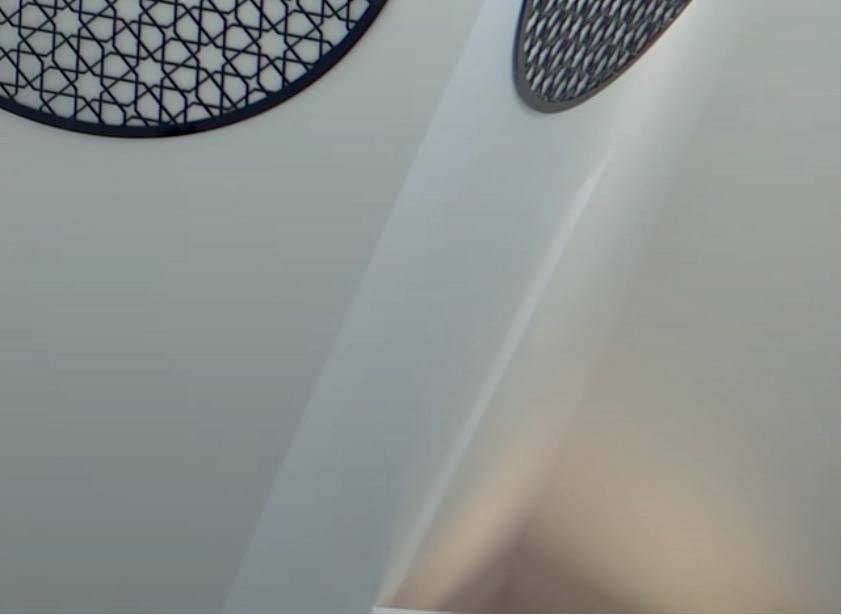
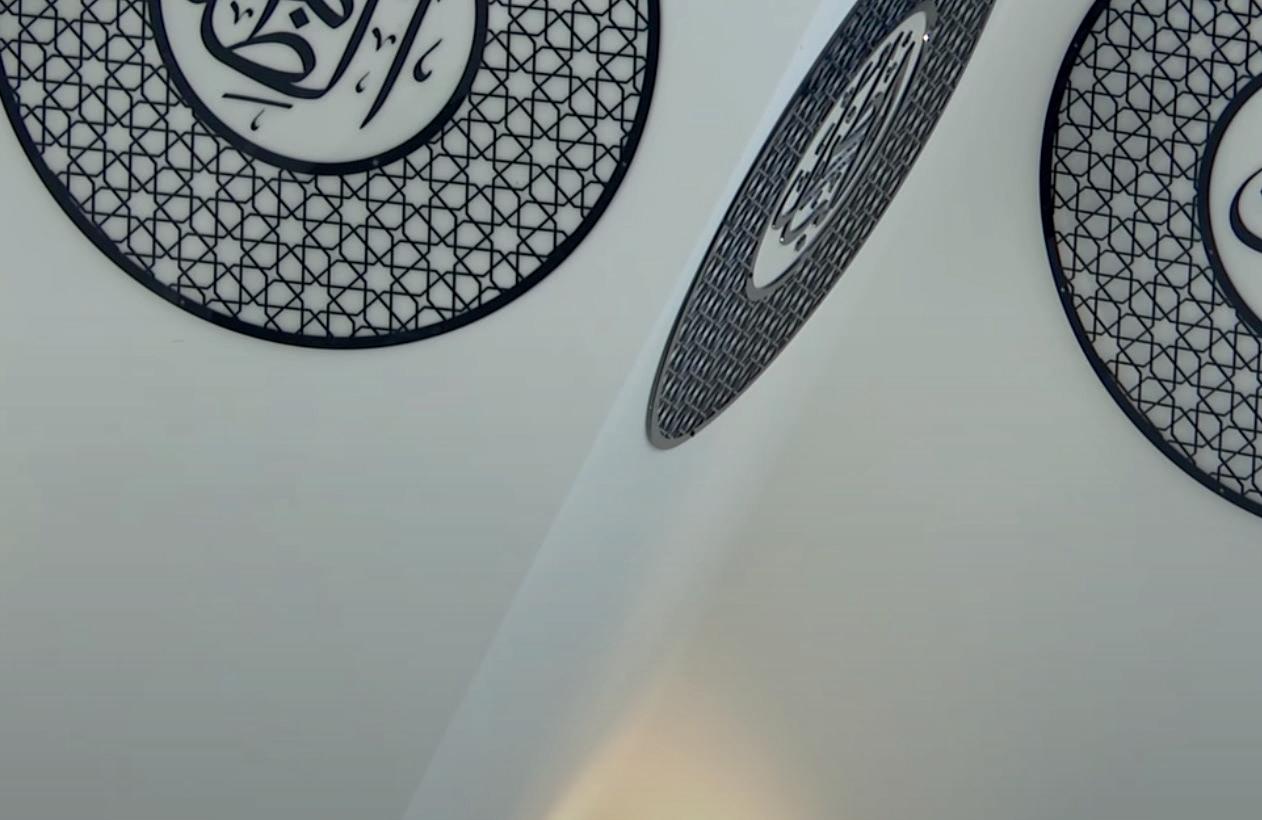
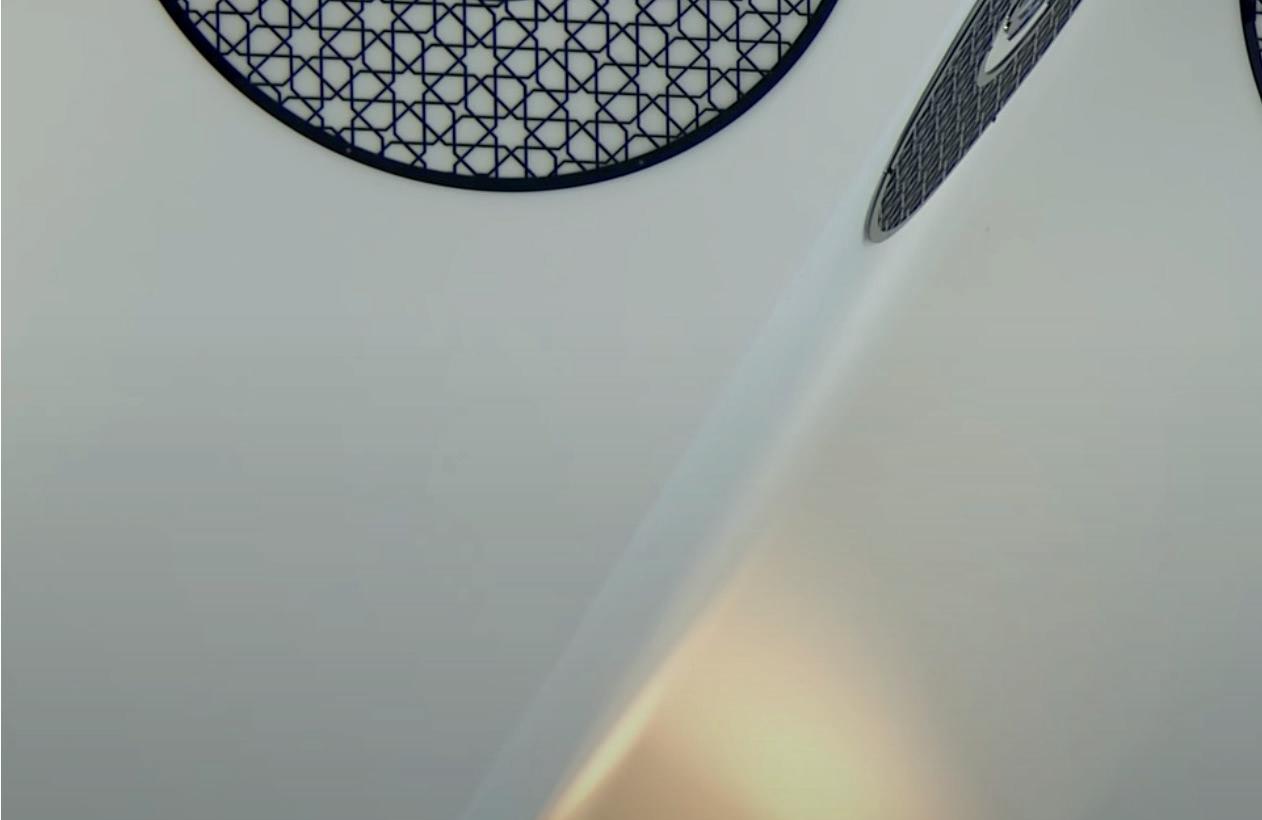
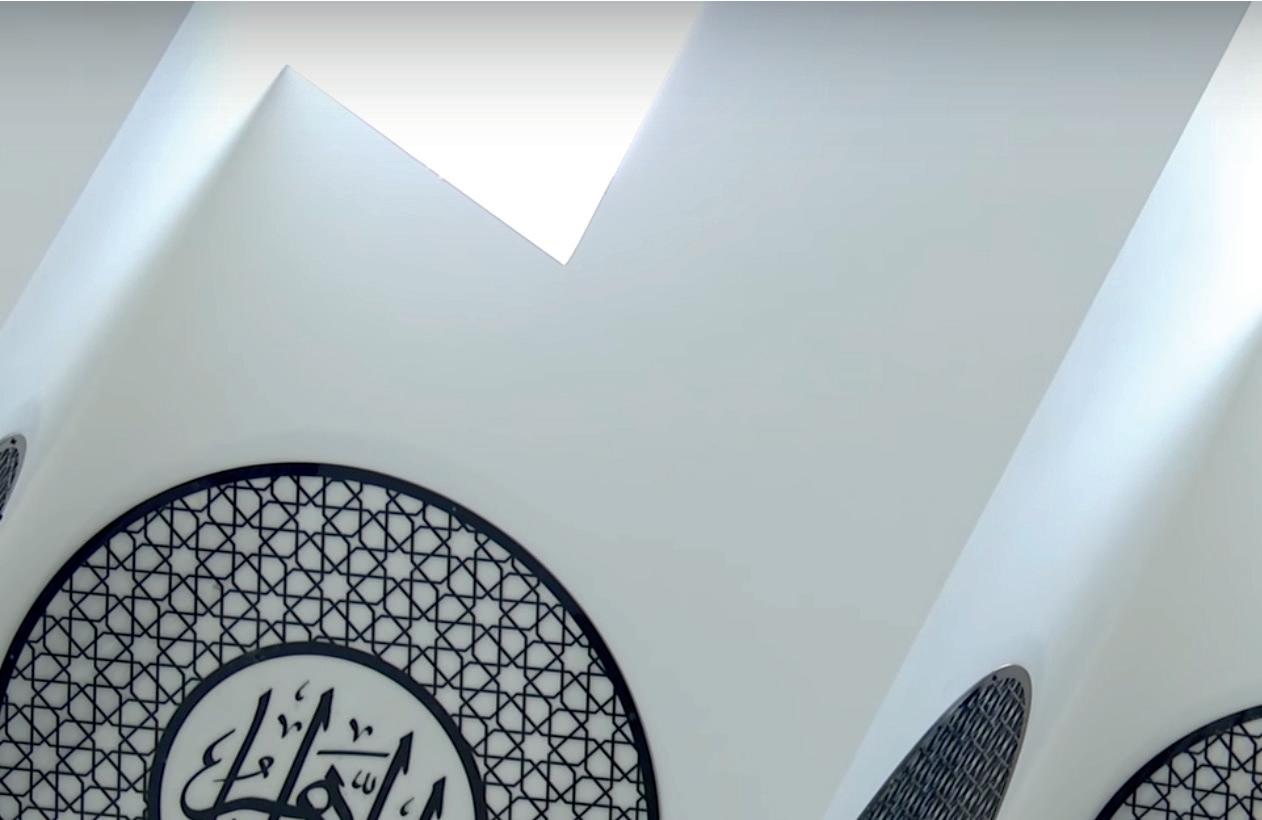
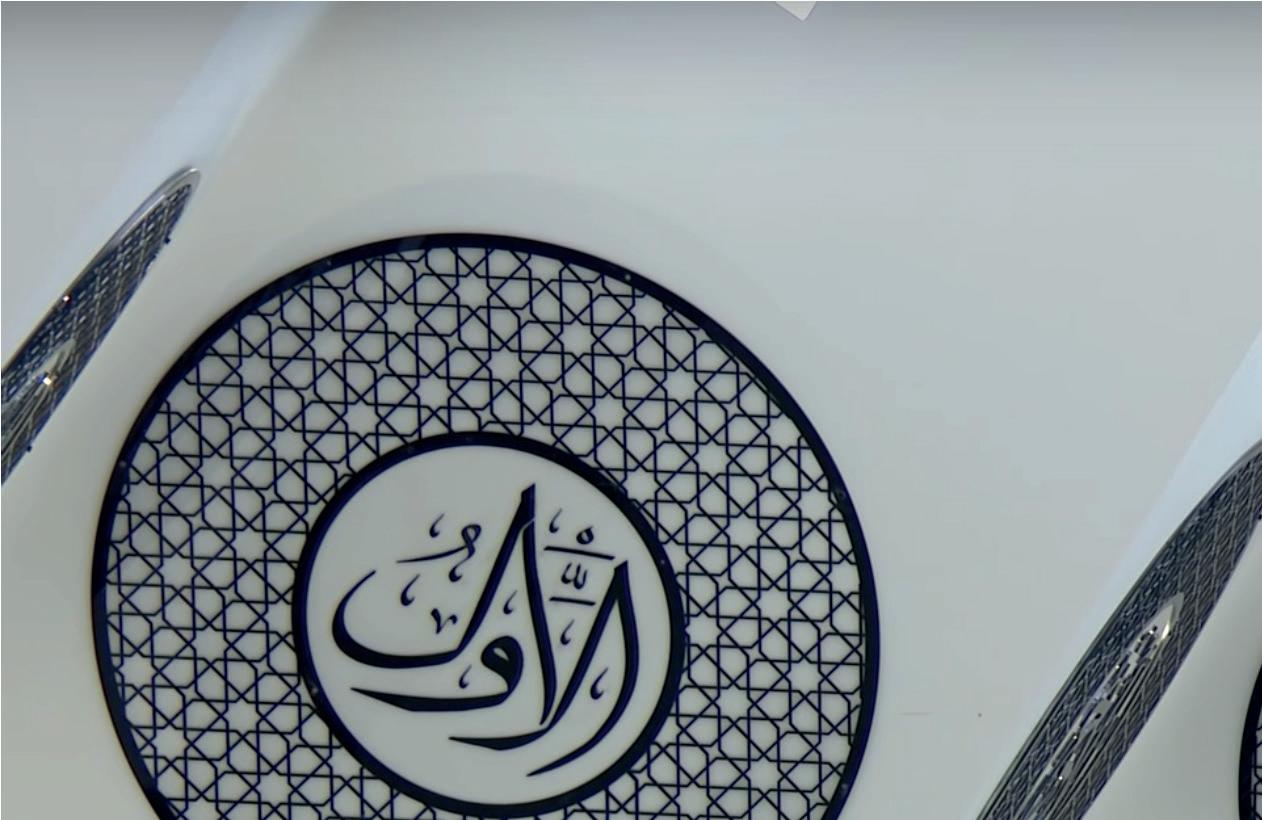
“O Allah! Do not allow me to suffer defeat against the Pharaoh of this ummah Do not allow him to escape from here.”
Following this, people began to search for him and Hazrat Abdullahra bin Mas‘ud eventually found him. (Al-Sirah alHalabiyyah, Bab Zikr Maghaziyyah, Vol. 2, p. 236, Dar al-Kutub al-‘Ilmiyyah, Beirut, 2002)
According to another narration, the Holy Prophetsa also prayed the following:
“O Allah! Do not allow him to escape
from Your grip.” (Tarikh at-Tabari, Vol. 2, p. 36, Dar al-Kutub al-‘Ilmiyyah, Beirut, 2012)
When the Holy Prophetsa ordered the people to find the body of Abu Jahl, Abdullahra bin Mas‘ud came across him whilst searching amongst those who had been slain. The Holy Prophetsa stated, “If you are not able to identify him, then you can recognise him by the wound mark on his knee. Once, on the occasion of a meal hosted by Abdullah bin Jud’an, I pushed Abu Jahl with such force that he fell on his knees and wounded his knee and the mark of the wound still remains on his knee. Ibn Mas‘ud states, “I managed to identify him by that very mark and at the time he was taking his final breaths. I placed my foot on his neck since he had tormented me a great deal in Mecca. I then said, ‘O enemy of God! Have you seen how God has humiliated you?’ Upon this, he said, ‘What is the reason for me to feel humiliated? So what if you manage to kill someone. There is nothing more to it. However, have you ever killed someone who possesses a loftier rank than me? Now, tell me, who was victorious in the battle?’”
Hazrat Abdullahra bin Mas‘ud states, “In his final moments, whilst I had my foot placed on his neck, Abu Jahl said to me, ‘O you lowly shepherd, you have set foot on a place where you should not have.’”
Abdullahra bin Mas‘ud states, “I then severed his head and brought it before the Holy Prophetsa and placed it at his feet and humbly submitted, ‘O Messengersa of Allah! This is the head of Abu Jahl, the enemy of God.’ Upon this, the Holy Prophetsa expressed his gratitude to God and said:
‘Holy is He, Who has no partner.’”
This is a narration from Ibn Hisham (Sirat Ibn Hisham, p. 433, Darl al-Kutub al‘Ilmiyyah, Beirut, 2001; Sharh al-Zurqani, Vol. 2, p. 297, Dar al-Kutub al-‘Ilmiyyah, Beirut; Sirat Ibn Hisham (translated), Vol. 1, p. 447, Idarah Islamiyyat)
In another narration, when Hazrat Abdullahra bin Mas‘ud killed Abu Jahl, he came before the Holy Prophetsa and informed the Holy Prophetsa about Abu Jahl’s death. The Holy Prophetsa then walked alongside Hazrat Abdullahra bin Mas‘ud and stated, “By Allah, there is none worthy of worship except Him.” Abdullahra bin Mas‘ud also repeated the same that “By Allah, there is none worthy of worship except Him.” The Holy Prophetsa then stood beside the dead body of Abu Jahl and said, “O enemy of Allah! May all praise be to Allah, Who has humiliated you.” (Musnad Imam Ahmad bin Hanbal, Vol. 2, p. 165, Hadith 44242, Alam al-Kutub, Beirut, 1998)
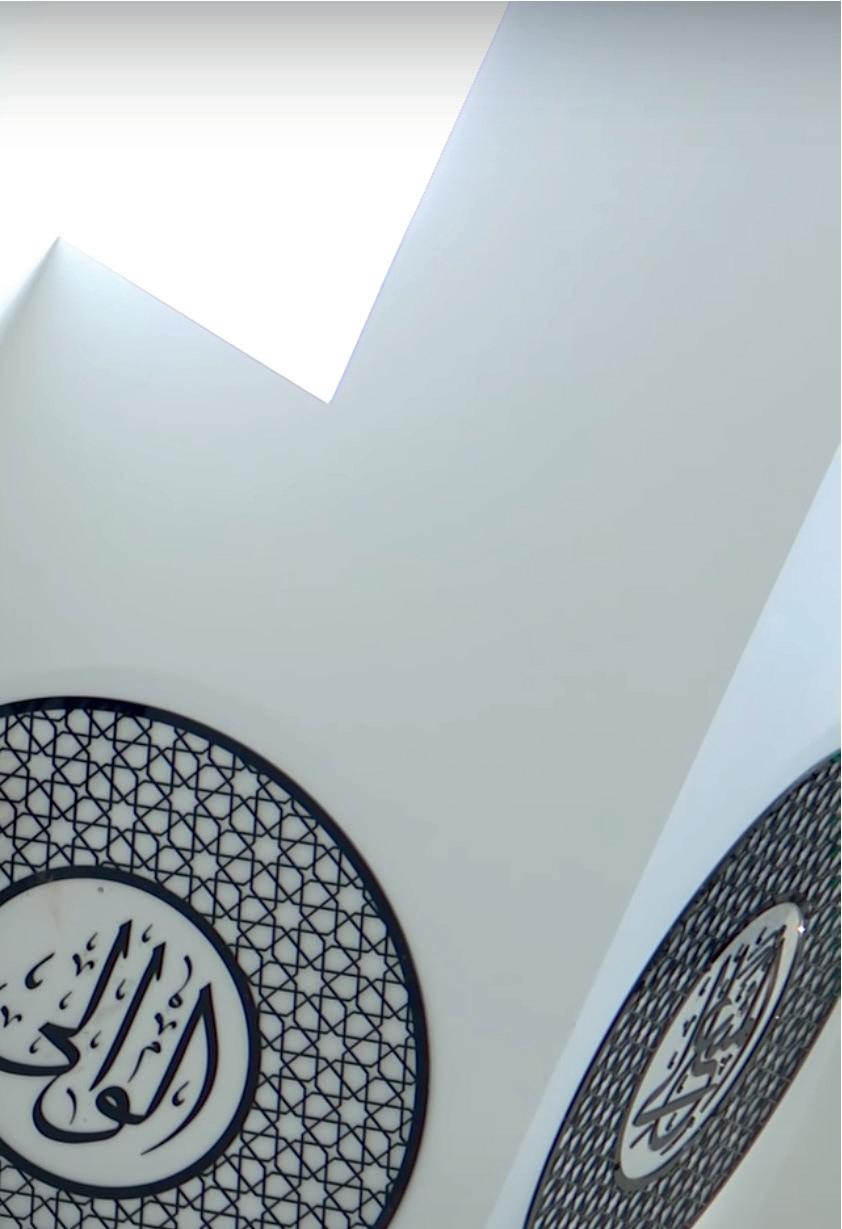
Hazrat Qatadahra narrates that the Holy Prophetsa stated, “Every ummah has a Pharaoh and the Pharaoh of my ummah is Abu Jahl. Allah the Almighty caused him to be killed very severely. The two sons of Afra and angels brought him down and Abdullahra bin Mas‘ud put him to an end.”
(Subul al-Huda wa al-Rashad, Vol. 4, p. 52, Dar al-Kutub al-‘Ilmiyyah, Beirut, 1993.)
The Promised Messiahas states:
“Abu Jahl has been described as Pharaoh, but in my view, he was far worse than Pharaoh because, after all, Pharaoh had proclaimed:
Friday 4 August 2023 | AL HAKAM 18
ہریﻏ ہلا ال یذلا ہللا
لیءآر�ا اونب ہب تنما یذلا الا ہلا ال ہنا تنما
“‘[…] I believe that there is no god but He in Whom the children of Israel believe…’ (Surah Yunus, Ch.10: V.91)
“However, Abu Jahl did not accept at all. All of the disorder in Mecca was owing to him. He was extremely arrogant, selfish and pretentious.” (Malfuzat [1984], Vol. 4, p. 247)
The Promised Messiahas states:
“Just like Prophet Mosesas, the Holy Prophetsa also saved the pious people of his nation from the brutal and bloodthirsty people and he took them from Mecca to Medina just like Prophet Mosesas did. Abu Jahl, who was the Pharaoh of this ummah, perished on the battlefield of Badr.” (Tiryaqul-Quloob, Ruhani Khazain Vol. 15, o. 532
Hazrat Musleh-e-Maudra states:
“On the occasion of Badr, when the disbelievers of Mecca came, they were convinced that now they would surely kill the Muslims. Abu Jahl stated that they would celebrate and drink lots of wine. They were determined not to return without killing the Muslims. However, Abu Jahl was killed by two youths of Medina –the disbelievers of Mecca would consider the people of Medina to be extremely lowly people and would refer to them as farmers (they thought that these people only know how to grow vegetables and cultivate land and are unacquainted with the art of warfare. Nevertheless, these two youths killed him) and he was made to endure such humiliation that even his final wish could not be fulfilled. It was a custom amongst the Arabs that if any leader was killed in battle, his head would be severed by striking him at the lower end of his neck, so it remained long and served as a sign that a leader had been slain. Abdullahra bin Mas‘ud found Abu Jahl whilst he was wounded and not moving at all. He asked him his condition and Abu Jahl replied that he was not sorrowful over anything except the fact that he had been killed by two farming children of Medina. Abdullahra then asked if he had any last wishes, to which he replied that his only wish was for his head to be severed from the lower end of his neck. Upon this, Abdullahra bin Mas‘ud stated that he would not even allow this wish of his to be fulfilled and fiercely cut his neck from just below his chin. What he thought was going to be an occasion of celebration became the occasion of his death and the alcohol he had consumed had not even been properly digested.” (Khutbat-e-Mahmud, Vol. 1, p. 11)
With regards to the Holy Prophetsa thowing stones at the idolaters, it is written in Sahih al-Bukhari that when the Holy Prophetsa was in his tent praying, Hazrat Abu Bakrra held his hand and said, “O Messengersa of Allah! Please stop. You have prayed extensively before your Lord.” At the time, the Holy Prophetsa was wearing his chainmail and came out of his tent and was reciting:
“Hence, be it Muhajirun or Ansar, both fought valiantly and sincerely. However, the enemy numbers and its strength in equipment proved to be an almost indestructible force, and the outcome of the war remained ambiguous for some time. The Holy Prophetsa was continuously engaged in fervent supplications, and his agony multiplied moment by moment. However, finally, after quite a long time, the Holy Prophetsa rose from prostration and stepped out of the tent, reciting the following Divine glad-tiding:
(The Life & Character of the Seal of Prophetssa, Vol. 2, p. 153)
In the commentary of the verse of Surah al-Anfal:
(Surah al-Anfal, Ch.8: V.18)
Imam Razirh writes:
“When the Quraish launched an attack, the Holy Prophetsa prayed, ‘O Allah, the people of the Quraish have brought their horses and prized possessions in order to reject and deny Your Messenger. O Allah, I seek of You what You promised to me.’ Upon this, Gabriel appeared and said, ‘O Messengersa of Allah, take a handful of sand and cast it towards the disbelievers.’ When the two armies clashed, the Holy Prophetsa instructed Hazrat Alira to bring a handful of sand and pebbles from the valley, which he threw at the faces of the disbelievers, saying,
(That is, may their faces be ruined.) As a result, the disbelievers began to wipe their eyes and were ultimately defeated. Then, Allah the Almighty stated:
That is, ‘It was not you who threw the handful of sand, for your throw would only have the impact of a human throw. In truth, it was Allah who threw it, owing to which the sand entered their eyes.’ Although the Holy Prophetsa carried out the act of throwing, its impact manifested through Allah the Almighty.” (Imam Razi, Tafsir al-Kabir, Vol. 8, p. 112, Dar al-Kutub al‘Ilmiyyah, Beirut, 2004)
Whilst describing events from this battle, Hazrat Mirza Bashir Ahmadra writes:
“Stepping out of his tent, the Holy Prophetsa cast a glance in all four directions to find the field of battle heated by bloodshed. At that time, the Holy Prophetsa took a handful of sand and pebbles and threw them towards the disbelievers, and fervently called out:
“‘May their faces be ruined.’
been related that at the time, some people even saw these angels. In any case, chieftains like ‘Utbah, Shaibah and Abu Jahl, had already been mixed to dust. As a result of this instant attack by the Muslims and the sudden gust of wind, the Quraish began to lose strength, and panic quickly erupted in the army of the Quraish. The field of battle was cleared in no time.” (The Life & Character of the Seal of Prophetssa, Vol 2, pp. 153154)
The Promised Messiahas states:
“At this level of communion with God, sometimes humans are able to carry out such actions that are beyond human capabilities and take on Divine strength and colour. For instance, our master and leader of all Prophets, the Seal of Prophets, peace be upon him, threw a handful of pebbles upon disbelievers during the Battle of Badr, and that handful of pebbles was not thrown by means of prayer but through his own spiritual strength. However, that handful of pebbles manifested with Godly force and fell upon the enemy forces in such a miraculous way that there was none among them whose eyes had not been impacted; they all became as though they were blind and were overcome by astonishment and anguish, causing them to run senselessly. It is this miracle to which Allah, the Almighty, alludes to in this verse[…] that is, ‘When you threw that handful, it was not you that threw it, but God Almighty Who threw it.’
In other words, Divine power manifested covertly. This was not the result of mere human strength.” (A’ina-e-Kamalat-e-Islam, Ruhani Khazain, Vol. 5, p. 65)
Nonetheless, within a short amount of time, the idolaters showed signs of failure and frustration. Their ranks were in disarray due to the vehement attacks of the Muslims. They began to panic and run about. The Muslims pursued and defeated them. Regarding the strong passion and zeal of Hazrat Sa‘dra in his opposition to the disbelievers, it is recorded that when the enemy finally admitted defeat and threw down their weapons, the Companions began capturing the disbelievers. Upon this, the Holy Prophetsa saw displeasure in Hazrat Sa‘d’sra expression. In other words, he was looking towards the Muslims’ course of action with displeasure. The Holy Prophetsa addressed Hazrat Sa‘dra and said, “O Sa‘d, it seems as though you are dissatisfied with imprisoning the idolaters.” Hazrat Sa‘dra submitted, “Indeed, O Messengersa of Allah. This is our first battle and victory against the idolaters, and in my opinion, it is better to kill as many of them as possible as opposed to keeping them alive.” (Al-Sirah al-Halabiyyah, Vol. 2, p. 230, Dar al-Kutub al-‘Ilmiyyah, Beirut, 2002)
He expressed that he did not wish to imprison them, rather, he desired to kill them all.
Battle of Badr. On the day that the Battle of Badr took place, the Holy Prophetsa said, “Behold Gabriel! He is holding the reins of his horse and is equipped with weapons of warfare.” Many narrations of the Companions recorded in Sirat Ibn Hisham confirm that angels descended during the Battle of Badr. (Da’irah Ma`arif-e-Sirat Muhammad Rasulullah(sa), Vol. 6, p. 214, Bazm Iqbal Lahore, April 2022)
There are many narrations by the Companions pertaining to this. The angel Gabriel appeared before the Holy Prophetsa and said, “Among the Muslims, how do you rank those who were present at Badr?” The Holy Prophetsa replied, “They are the best Muslims,” or a statement of this nature. Gabriel replied, “In the same manner, those angels are the most superior who participated in the Battle of Badr.” (Sahih al-Bukhari, Kitab al-Maghazi, Bad Shuhood al-Mala’ikah Badran, Hadith 3992)
One biographer has also recorded a narration of Hazrat Ibn Abbasra, who states, “A man from the Banu Ghaffar told me the following: ‘My paternal cousin and I climbed a mountain from which we could see the battlefield of Badr. We were idolaters and were waiting to see who would face defeat so that we could join those who plunder. Whilst we were on that mountain, a cloud drew near to us. From it, we could hear the sound of horses neighing. Then I heard a voice that called out, saying, “O Haizum, move forward.” Upon hearing that voice, my paternal cousin’s heart ruptured, and he died there and then. As for me, I too was near death, however, I was able to hold myself together.’” (Sirat Ibn Hisham, p. 431, Dar al-Kutub al-‘Ilmiyyah, Beirut, 2001)
Sohail bin ‘Amr, who was a disbeliever at the time, says, “On the day of the Battle of Badr, I saw people [dressed] in white, riding black and white spotted horses. They were between the heavens and the earth and were killing and capturing the people of the Quraish.” Thus, it was not only the Muslims who witnessed angels during the Battle of Badr, but the disbelievers saw them also. (Da’irah Ma`arif-e-Sirat Muhammad Rasulullahsa, Vol. 6, p. 215, Bazm Iqbal Lahore, April 2022)
Abu Usaid Malik bin Rabi’ah, who was present during the Battle of Badr, narrates an incident after he had lost his vision. He said, “Had I been at Badr today and I still had my vision (when he said this, he had already lost his vision, but he was relating something about Badr when he was still able to see and he witnessed the Battle of Badr with his own eyes) then I would certainly have shown you the valley where the angels came out from. I have no doubt or confusion about this.”
“The hosts shall soon be routed and will turn their backs in flight. Aye, the House is their appointed time; and the Hour will be most calamitous and bitter.” (Surah alQamar, Ch.54: V.46-47)
The details of this have been written in The Life and Character of the Seal of Prophets by Hazrat Mirza Bashir Ahmadra as follows:
“Then, the Holy Prophetsa called out to the Companions to launch a sudden attack. When the voice of their Beloved Master reached their ears, they raised a slogan of God’s Greatness, and pushed forward with an instant assault. On the other hand, the Holy Prophetsa had only just thrown a handful of sand when a gust of wind began to fill the eyes, mouths and noses of the disbelievers with pebbles. The Holy Prophetsa said, ‘This is an army of God’s angels who have come to support us with divine succour.’ In some narrations, it has also
Regarding angels descending during the Battle of Badr, Allah the Almighty states in the Holy Quran:
“When you implored the assistance of your Lord, and He answered you, saying, ‘I will assist you with a thousand of the angels, following one another.’” (Surah al-Anfal, Ch.8: V.10)
The Holy Prophetsa has also testified to the fact that angels descended during the
Abu Da’ud Ma’zani, who was present at the Battle of Badr, narrates, “No doubt, on the day of Badr, I chased after a disbeliever in order to attack him, when all of a sudden, I saw that his head was severed before my sword even reached him. I realised that someone else had killed him.”
Hazrat Abdullahra bin Abbas narrates that on the day of Badr, the angels could be recognised by their white turbans with the ends hanging on their backs, while on the day of Hunain, they were recognised by their red turbans. Hazrat Alira narrates that the turban is an Arab’s crown, and on the day of Badr, the angels could be recognised by their white turbans, which were hanging
19 AL HAKAM | Friday 4 August 2023
ربدلا نولویو عمجلا مزہیس رماو یہدا ۃعاسلاو مہدعوم ۃعاسلا لب
ربدلا نولویو عمجلا مزہیس
یمر ہللا نکلو تیمر ذا تیمر امو
ہوجولا تہاش
یمر ہللا نکلو تیمر ذا تیمر امو
ہوجولا تہاش
ملا نم فل اب مک دمم ین ا مکل باجتساف مکب ر ن وثیغتست ذ ا نیفدرم ۃکئل
on their backs, but Gabriel was wearing a yellow turban.
Hazrat Ibn Abbasra narrates that the angels did not fight in any battle aside from the Battle of Badr. They participated in other battles only to increase numbers and help, however, they would not actually fight anyone. (SIrat Ibn Hisham, pp. 431432, Dar al-Kutub al-‘Ilmiyyah, Beirut, 2001)
This narration is from Sirat Ibn Hisham
Some people think that the descending of angels was only for the believers as a form of glad tidings and to give them comfort, otherwise, the angels did not actively take part in the war. This thought contradicts authentic narrations. It is proven through authentic narrations that the angels actively took part in the battle. However, the issue arises that if a single angel would have been enough to help, then why did thousands of angels descend?
After citing the narrations from Sahih alBukhari and Sahih Muslim about angels descending during the battle, Imam Ibn Kathir writes, “The angels being sent by Allah and the Muslims being informed of this was a form of glad tidings, otherwise, Allah could have helped the Muslims against the disbelievers even without this. This is why He has stated that help comes only from Allah and in Surah Muhammad Allah says that if He desired, he could have taken retribution from the disbelievers Himself, if He so desired. However, He tries people.” (Da’irah Ma‘arif-e-Sirat Muhammad Rasulullah(sa), Vol. 6, pp. 218219, Bazm Iqbal Lahore, April 2022)
Hazrat Musleh-e-Maudra states:
“During the Battle of Badr, God Almighty manifested Himself from the clouds. In other words, the battle had not yet started when it rained, which caused the disbelievers great loss and rendered the believers great benefit from the standpoint of war. Then, in order to help the believers and to establish their awe over the disbelievers, the angels also descended upon the hearts. In fact, during the Battle of Badr, there were many disbelievers who saw them with their own eyes, and in accordance with a matter decreed, the Arab chieftains were killed one by one.” (Tafsir-eKabir, Vol. 2, p. 458)
Similarly, in Tafsir-e-Saghir in the explanatory note under Surah Aal-e-Imran verse 127 it is written:
“The only reason angels have been mentioned is that when a person receives glad tidings in a dream or a vision, it increases their resolve, otherwise, the actual message was that God would help them.” (Tafsir-e-Saghir, p. 96, Surah Aal-eImran, V. 127)
In any case, this was a vision with appeared as reality and was seen by others, even the non-Muslims.
The Promised Messiahas writes about this in at-Tabligh, which is a part of A’inae-Kamalat-e-Islam which is in Arabic. The Arabs sometimes say that when I read longer passages, it poses difficulties for them in translation, and so I try to also read out the Arabic. The Promised Messiahas states:
The translation is as follows:
“It has always been Allah the Almighty’s practice and custom to keep those matters hidden that require the wisdom behind them to remain hidden and where the people’s desires and opinions are contrary to the reality at hand. Sometimes, He shows a great incident to appear small and insignificant or expresses a small incident to appear grand and extraordinary. Sometimes He makes an incident of glad tidings appear as a warning, or a warning to appear as a glad tiding. These are the four types of incidents which continue according to the practice of Allah the Almighty. There was the great incident of Badr, which Allah the Almighty desired to make appear as if it were a minor and insignificant matter. Hence, whosoever desires to, should ponder and open their eyes. On the occasion of Badr, Allah showed the Holy Prophetsa a dream in which the enemies of Islam seemed smaller in number, so that the Muslims would not fear them and so that Allah’s desire would come to fruition. Then, that which Allah desired to appear grand and extraordinary had been likened in the Holy Quran to the glad tidings of the help of angels, in order to ease the hearts of the believers and so that they would have no fear during the battle. Hence, in the Holy Quran, Allah the Almighty promised the believers and gave them the glad tiding that He would grant them help with five thousand angels. This help was expressed to be greater so that it may be a form of glad tidings for them, even though a single angel holds the power to destroy the earth upon the command of his Lord. Hence, there was no actual need for five, let alone five thousand. However, Allah the Almighty desired to manifest His mighty help, and so He used such words that expressed the great number of those rendering help and this is exactly what was meant. Then, after the victory of Badr, he informed the believers that the
number of angels was not limited to mere words, rather its actual meaning was that which Allah the Almighty, the Most High and Exalted, knows. Allah did this so that through this glad tiding, He may grant their hearts ease and increase their positive thinking and hope.” (At-Tabligh, Ruhani Khazain, Vol. 5, pp. 447-449)
Regarding the defeat suffered by the disbelievers, it is written that after a short while the disbelieving army began to show signs of defeat and helplessness when the open warfare began. Their ranks were completely upended by the fierce attacks of the Muslims. The battle was almost over, as was mentioned earlier, and the disbelievers retreated in an unorganised manner and it turned into a stampede. The Muslims followed them, killing them, striking them and capturing them until they meted out a resounding defeat. (Al-Rahiq al-Makhtum (Translated), p. 299, Al-Maktabah alSalafiyyah, Lahore, 2000)
In one narration it is mentioned that this battle was a humiliating defeat for the idolaters and a manifest victory for the Muslims. In this battle, 14 Muslims were martyred; six from the Muhajirun and eight from the Ansar. In contrast, the idolaters suffered a heavy defeat; 70 of their men were killed and 70 were captured, most of whom were the prominent chieftains and leaders [of the Quraish]. (Al-Rahiq al-Makhtum (Translated), p. 306, AlMaktabah al-Salafiyyah, Lahore, 2000)
The Companions who were martyred in the Battle of Badr numbered 14 in total, as mentioned before, six of them were from the Muhajirun and eight were from among the Ansar. The name of the Muhajirun were: Ubaidah bin Harith bin Muttalib, Umair bin Abu Waqqas, Dhu al-Shimalain, i.e. Umair bin Abd Amr, Aaqil bin Bukair, Mihja, the freed slave of Umar bin al-Khattab, and Safwan bin Baida. The martyrs from among the Ansar were: Sa‘d bin Khaithamah, Mubashir bin Abdul Munzir, Yazid bin Harith, Umair bin Humam, Rafi bin al-Mu’alla, and Harithah bin Suraqah.
Among the idolaters 70 men were killed, the majority of whom were the chieftains of the Quraish. The prominent names of those who were killed are as follows: Hanzalah bin Abu Sufyan, Harith bin Hadrami, Ahmar bin Hadrami, Ubaid bin Sa’id bin al-Aas, Aas bin Sa’id bin al-Aas, Uqba bin Abi Mu’it, Utbah bin Rabi’ah, Shaibah bin Rabi’ah, Walid bin Utbah bin Rabi’ah, Harith bin Aamir Abul Bakhtari, Aas bin Hisham, Nadr bin Harith, Abul Aas bin Qais, Aas bin Hisham has been mentioned twice or they are two separate people, Umayyah bin Khalaf, Abu Jahl, whose name was Amr bin Hisham. The majority of these people were those who would inflict harm on the Muslims and the Holy Prophetsa in Mecca. (Sirat Ibn Hisham, p. 476-480, Dar al-Kutub al‘Ilmiyyah, Beirut, 2001; Kitab al-Maghazai li al-Waqidi, Vol. 1, p. 145, Aalam al-Kutub, Beirut, 1984)
God-willing, the remaining accounts will be mentioned in the future.
I would like to draw your attention towards offering prayers. Pray for the
Muslims of Palestine; may Allah create ease for them, support the oppressed, and grant them leaders, who fulfil their rights, rightfully guide them and strive to save them from injustices. They are having to endure extreme oppression and it seems as if there is no one to take care of them and guide them. If the Muslims become united, they can avert these difficulties. Similarly, in Sweden and in some other countries, the wrongdoers have been given permission to do whatever they wish in the name of “freedom of speech and religion”. Through this, day in and day out, they are perpetrating acts that hurt the sentiments of Muslims.
Their actions are absolutely despicable; they dishonour the Holy Quran or use abusive language against the Holy Prophetsa. Allah the Almighty is the One Who can seize them. Even for this, the Muslim governments are at fault, because owing to their disunity and quarrels, the anti-Islamic organisations carry out these wrongful acts. If there is a response from the Muslims, it is only temporary and even then it is ineffective. Thus, pray earnestly for the leaders of the Muslim world and the Muslim ummah, there is a great need for this. There is also a dire situation in France where Muslims are being targeted. The response by the Muslims is also wrong, as are those who are assisting them.
Nothing will be achieved through disorder and violence. The Muslims need to act in accordance to the Islamic teachings. Only when their words and deeds are in accordance with the Islamic teachings, will they attain any kind of success. In any case, we can only pray; thus, pray especially for the Muslim world and for the world in general as well that may Allah the Almighty protect everyone from injustices, establish peace and harmony in the world and enable everyone to understand the importance of fulfilling the rights of one another. Otherwise, as I have mentioned many times that the world is heading towards huge destruction. May Allah the Almighty grant His mercy.
Similarly, pray for the Ahmadis in Pakistan; may Allah the Almighty protect them from every kind of evil. In France, although it appears that there are a lot of protests taking place in support of the young boy who was killed, in reality, the reaction of the people there is such that I have heard that the fund-raising campaign was carried out for both the boy who was killed and the police officer who was arrested. The campaign for the boy has only raised 200,000 euros, whereas, for the police officer, regarding whom they have said that they will take action against and even the government has issued statements to this effect, they have raised over a million euros for him. May Allah the Almighty grant mercy, enable the people to act with justice and also enable the Muslims to become united.
(Official Urdu published in the Daily Al Fazl International, 24 to 29 July 2023, pp. 5-10. Translated by The Review of Religions.)
Friday 4 August 2023 | AL HAKAM 20
Editor-in-chief: Qaasid Muin Ahmad | Executive editors: Ataul Fatir Tahir, Aqeel Ahmed Kang | Research coordinator: Awwab Saad Hayat | Associate editors: Jalees Ahmad, Ata-ul-Haye Nasir
Translations: M Adam Ahmad | Design: Tahmeed Ahmad | © Al Hakam 2023
یف متکلاو ءافخالا راتخی ہنا ہتنس و ہتداع ترج دق و رشحتف ءاوہالا قلخی و اہ ءافخا ہتمکح تﻀق تاعقاو ﺲفن ۃروﺻ ءافخا دارأ اذإ و ۔یر�أ تاہج یلا ءار�لا ۃریغﺻ ۃریبکلا ۃعقاولا عﺿاوملا کلت یف یری امبر� ۃعقاو ۃعقاولاو ۃردان ۃریبک ۃنونسملا ۃریغﺼلا ۃعقاولاو ’ ۃنوہم ۃع�رأ ہذہف ۔ ۃرشبم ۃفوخملا ۃعقاولاو ۃفوخم ۃرشبملا ۃعقاولا امأ ۔یﻀم امک ہللا ن�س نم تاعقاولا نم ماسقأ ۃریقح ۃریغﺻ اہیری نا ہللا دارا یتلا ۃمیظعلا ۃریبکلا ناف ۔یری و ربدتی نمِل ردب ۃعقاو نآر�لا یف اہریظنف بہذیِل ہِلوسر مانم یف ردبب مالسالا ءادعا للق ہللا و ۔ءاﻀقلا نم دارأ ام یﻀق� و نیملسملا بولق نع عورلا اہریظنف ۃردان ۃریبک اہیری نا ہللا دارا یتلا ۃعقاولا امأ نینمؤملا بولق ر�ت یک ۃکﰱالملا ددم ۃراﺸب نآر�لا یف یف دعو یلاعت ہناف ۔یوﺄملا کِلاذ یف ۃفیخ مہذخﺄت ال و نم فالآ ۃسمخب مہدمی ہنﺄب مہرشب و نینمؤملِل نآر�لا نال ۔یرشب مہل الإ ریثکلا ددعلا اذہ لعج ام و ۃکﰱالملا یِلاع لعجی نا یلع ہبر نذاب ردق� ۃکﰱالملا نم ادر� یلا لب فالآ ۃسمخ یلا ۃجاح ناک امف اہلفاس ضرالا اظفل راتخاف ؐۃمیظع ۃر�ن مہیری نا ءاش ہللا نکلو ۃسمخ ینعملا نم دارا ام دارا و نیدمملا ۃر�ک ہرہاظ نم مہف� تناک ام ۃکﰱالملا ۃدع نا ردب حتف دع� نینمؤملا ہبن مﺛ ہملع� لیوﺄتب ۃلوؤم تناک لب اہظافلا رہاظ یلع ۃلومحم مہبولق نئمطتِل کِلاذک لعف و ۔یلعالاو عفر�لا ہملع� ہللا ءاجرلاو نظلا نسح مہدیزی و یرشبلا ہذہب

























 Shazia Sohail Secretary Ishaat, Lajna Imaillah USA
Shazia Sohail Secretary Ishaat, Lajna Imaillah USA







